100组易混淆的英语词汇
- 格式:doc
- 大小:124.00 KB
- 文档页数:22
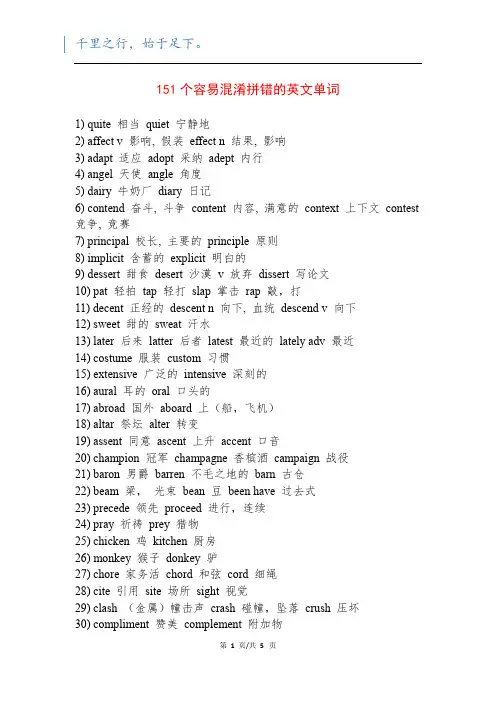
151个容易混淆拼错的英文单词1) quite 相当quiet 宁静地2) affect v 影响, 假装effect n 结果, 影响3) adapt 适应adopt 采纳adept 内行4) angel 天使angle 角度5) dairy 牛奶厂diary 日记6) contend 奋斗, 斗争content 内容, 满意的context 上下文contest 竞争, 竞赛7) principal 校长, 主要的principle 原则8) implicit 含蓄的explicit 明白的9) dessert 甜食desert 沙漠v 放弃dissert 写论文10) pat 轻拍tap 轻打slap 掌击rap 敲,打11) decent 正经的descent n 向下, 血统descend v 向下12) sweet 甜的sweat 汗水13) later 后来latter 后者latest 最近的lately adv 最近14) costume 服装custom 习惯15) extensive 广泛的intensive 深刻的16) aural 耳的oral 口头的17) abroad 国外aboard 上(船,飞机)18) altar 祭坛alter 转变19) assent 同意ascent 上升accent 口音20) champion 冠军champagne 香槟酒campaign 战役21) baron 男爵barren 不毛之地的barn 古仓22) beam 梁,光束bean 豆been have 过去式23) precede 领先proceed 进行,连续24) pray 祈祷prey 猎物25) chicken 鸡kitchen 厨房26) monkey 猴子donkey 驴27) chore 家务活chord 和弦cord 细绳28) cite 引用site 场所sight 视觉29) clash (金属)幢击声crash 碰幢,坠落crush 压坏30) compliment 赞美complement 附加物31) confirm 确认conform 使服从32) contact 接触contract 合同contrast 对比33) council 议会counsel 忠告consul 领事34) crow 乌鸦crown 王冠clown 小丑cow 牛35) dose 一剂药doze 打盹36) drawn draw 过去分词drown 溺水37) emigrant 移民到国外immigrant 从某国来的移民38) excess n 超过exceed v超过excel 擅长39) hotel 青年旅社hostel 旅店40) latitude 纬度altitude 高度gratitude 感谢41) immoral 不道德的immortal 不朽的42) lone 孤独的alone 单独的lonely 孤独的43) mortal 不死的metal 金属mental 神经的medal 勋章model 模特meddle 玩弄44) scare 惊吓scarce 缺乏的45) drought 天旱draught 通风, 拖拉draughts (英)国际跳棋47) assure 保证ensure 使确定insure 保险48) except 除外expect 期望accept 接受excerpt 选录exempt 免除49) floor 地板flour 面粉50) incident 大事accident 意外51) inspiration 灵感aspiration 渴望52) march 三月, 前进match 竞赛53) patent 专利potent 有力的potential 潜在的54) police 警察policy 政策politics 政治55) protest 抗议protect 爱护56) require 需要inquire 询问enquire 询问acquire 获得67) revenge 报仇avenge 为...报仇68) story 故事storey 楼层store 商店69) strike 打stick 坚持strict 严格的70) expand 扩张expend 花费extend 延长71) commerce 商业commence 开头72) through 通过thorough 彻底的(al)though 尽管thought think 过去分词73) purpose 目的suppose 假设propose 建议74) expect 期望respect 敬重aspect 方面inspect 视察suspect 怀疑75) glide 滑翔slide 使滑行slip 跌落76) steal 偷steel 钢77) strive 努力stride 大步走78) allusion 示意illusion 幻觉delusion 错觉elusion 躲避79) prospect 前景perspective 透视法80) stationery 文具stationary 固定的81) loose 松的lose 丢失loss n 损失lost lose过去式82) amend 改正, 修正emend 校正83) amoral unmoral immoral 同义不道德的84) capitol 大厦capital 首都85) casual 任凭的causal 表缘由的86) extend 延长extent 长度extant 现存的87) inability 没力量disability 残疾88) personnel 人事personal 个人的89) statue 塑像statute 法令stature 身长status 地位90) widow 寡妇window 窗户91) socks 短袜stockings 长筒袜92) tax 税taxi 出租93) definite 不定的infinite 无限的94) grim 严酷的grime 污点95) crayon 蜡笔canyon 山谷96) recent 最近resent 生气97) phrase 短语phase 阶段98) mission 使命emission 散发, 放射mansion 大厦99) vision 视觉version 译本100) gasp 上气不接下气grasp 抓住101) delicate 微妙的dedicate 献身101) idle 空闲的idol 偶像102) induce 促使,劝诱deduce 推想reduce 削减seduce 诱使103) lapse 消逝elapse 消逝eclipse 日食104) rude 粗鲁的crude 自然的105) source 水源sauce 酱油saucer 茶托resource 资源recourse 求援106) sled (儿童)雪橇sledge 雪橇107) stripe 条纹strip 条trip 旅行108) vocation 职业vacation 假期evocation 召集revocation 撤回109) ardor 热忱adore 崇拜adorn 装饰110) area 区域era 时代111) resemble 象... assemble v 集合,装配assembly n 集合, 装配112) assume 假定resume 恢复113) attain 达到obtain 获得abstain 放弃114) award 授予reward 奖赏115) baggage (American English) luggage 行李116) badge 徽章bandage 绷带117) blade 刀刃bald 秃的bold 大胆118) bloom 开花blossom 开花(结果实) bosom 胸口119)blush 脸红flush 发红(脸)120) bride 新娘bribe 贿赂121) growl 咆哮howl 狼叫122) depress 使懊丧suppress 镇压oppress 压迫123) dime 一角dim 暗淡的124) dizzy 眼花缭乱dazzle 使眼花125) brown 褐色brow 眼眉blow 打击126) bullet 子弹bulletin 公告127) carton 纸板盒cartoon 动画128) chivalry 骑士精神cavalry 骑兵队129) collar 领子cellar 地窖color 颜色130) vanish 消逝evanish 使消逝131) intrude 入侵extrude 逐出detrude 推下132) contort 扭弯distort 弄弯retort 反对133) eminent 杰出的imminent 靠近的134) decline 下降recline 放置incline 倾斜135) exclaim 呼喊proclaim 宣布acclaim 欢呼declaim 朗诵136) edict 法令indict 控告137) perfuse 泼洒profuse 铺张的138) reject 拒绝eject 逐出inject 注射deject 使懊丧139) literacy 识字literary 文学的literature 文学literal 文字的140) median 中心的,中线的medium 媒体141) expel 驱除repel 反击impel 推动dispel 驱散142) rip 撕ripe 熟的143) wench 绞车wrench 扭伤144) confidant 知己confident 有信念的145) dine 吃饭diner 吃饭人dinning n 吃饭dinner 晚饭146) dreg 渣滓drag 拖拉147) faint 失去知觉feint 佯攻148) imprudence 轻率impudence 无耻149) specie 硬币species 种类150) hanger 钩子hangar 棚厂hunger 饥饿151) suite 一(套,批) suit一套衣服。
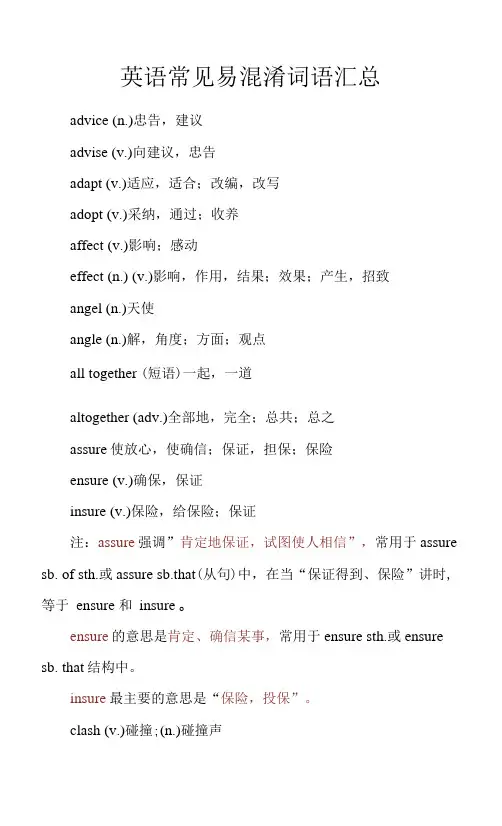
英语常见易混淆词语汇总advice (n.)忠告,建议advise (v.)向建议,忠告adapt (v.)适应,适合;改编,改写adopt (v.)采纳,通过;收养affect (v.)影响;感动effect (n.) (v.)影响,作用,结果;效果;产生,招致angel (n.)天使angle (n.)解,角度;方面;观点all together (短语)一起,一道altogether (adv.)全部地,完全;总共;总之assure使放心,使确信;保证,担保;保险ensure (v.)确保,保证insure (v.)保险,给保险;保证注:assure强调”肯定地保证,试图使人相信”,常用于assure sb. of sth.或assure sb.that(从句)中,在当“保证得到、保险”讲时, 等于ensure 和insure oensure的意思是肯定、确信某事,常用于ensure sth.或ensure sb. that结构中。
insure最主要的意思是“保险,投保”。
clash (v.)碰撞;(n.)碰撞声crash摔坏;坠毁;失败;(n.)失败,瓦解;爆炸声,撞击comprise (v.)包括,包含,构成compose (v.)组成,构成;创作试比较:The United States comprises 50 states.(包括)The committeecomprise seven members.(由组成)Our party is composed of teachers and students.(由组成)Water is composed of hydrogen and oxygen.(由构成)compliment (v.)称赞,恭维;(n.)问好,致意,赞扬complement (v.)补充;(n.)补语consciousness (n.)意识,觉悟,自觉conscience (n.)良心,良知considerable (adj.)相当大(多)的,可观的;值得考虑的considerate (adj.)考虑周到的,体谅人的contest (n.)比赛,竞争context (n.)上下文,内容credible (adj.)可信的creditable (adj.)值得称赞的,带来荣耀的descent (n.)下降;下来;出身decent (adj)像,体面的,恰当的distract (v.)分神,打扰;扰乱,迷惑contract (v.)收缩;订约,签合同subtract (v.)减去,扣除device (n.)手段,办法;装置devise (v.)想出,设计出discern (v.)认出,发现;识别concern (v.)涉及,关系到;关心dominant (adj.)支配的,统治的,占优势的dominate (v.)支配,统治控制effective (adj.)有效的,产生效力的;实在的,实际的efficient (adj.)(指人)有能力的,能干的healthful (adj.)对健康有益的healthy (adj.)健康的hanged (hang的过去式及过去分词)绞死hung (hang的过去式及ed分词)悬挂imaginative (adj.)富于想象力的imaginary (adj.)假想的,想象中的,虚构的intelligent (adj.)聪明的,智慧的,理解力强的intelligible (adj.)可理解的,能懂的intellectual (n.)知识分子;(adj.)智能的,显示智力的,有智力的intense (adj)强烈的,剧烈的intensive (adj.)仔细的,精细的inspiration (n.)灵感;给人以灵感的人(或物)aspiration (n.)志向,抱负;渴望达到的目标;送气;送气drought (n.)久旱,旱灾draught (n.)(令人不适的)对流风,穿堂风costume (n.)(某国或某一历史时期或适合某种活动的)服装custom (n.)习惯;风俗,习俗;传统chore (n.)日常琐事;杂务;乏味的例行工作chord (n.)(音乐的)和弦,和音cord (n.)( 一段)绳,索,线council (n.)委员会;理事会;(地区、镇、市的)政务委员会;地方议会counsel (n.)(尤指对社会或个人问题)建议,劝告,忠告consul (n.)领事casual (adj.)随便的;(衣服)休闲的;便装的causal (adj.)表原因的delicate (adj.)微妙的;脆弱的;娇嫩的dedicate (v.)奉献,献出(全部精力、时间等)extend (v.)扩大;扩展;使增加长度extent (n.)面积,范围;长度;数量extant (adj.)现存的;尚存的grim (adj.)令人担忧的,令人沮丧的grime (n.))亏垢,尘垢,积垢lessen (v.)减少,减轻lesson (n.)功课;经验,教训personal (adj.)个人的,私人的;亲自的,本人的;身体的personnel (n.)全体人员,全体职员;人事部门precede (v.)先于,领先于,在……前proceed (v.)进行,继续下去;发生exceed (v.)超过,胜过;越出principal (n.)校长;主要人物;(adj.)主要的,基本的principle (n.)原则,原理progressive (adj.)进步的,先进的;前进的successive (adj.)连续的,接连的resemble (v.)像;看起来像;与…相似assemble (v.)集合,聚集;收集assembly (n.)(尤指为特定目的而经常)聚集在一起的人,(所有)与会者;集合,聚集stationery (n.)文具;优质信笺信封stationary (adj.)静止的;不变的;稳定的。
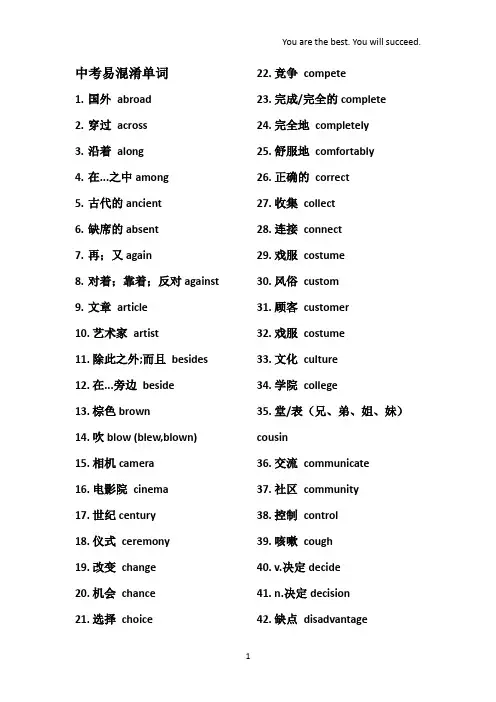
You are the best. You will succeed.中考易混淆单词1.国外abroad2.穿过across3.沿着along4.在...之中among5.古代的ancient6.缺席的absent7.再;又again8.对着;靠着;反对against9.文章article10.艺术家artist11.除此之外;而且besides12.在...旁边beside13.棕色brown14.吹blow (blew,blown)15.相机camera16.电影院cinema17.世纪century18.仪式ceremony19.改变change20.机会chance21.选择choice 22.竞争compete23.完成/完全的complete24.完全地completely25.舒服地comfortably26.正确的correct27.收集collect28.连接connect29.戏服costume30.风俗custom31.顾客customer32.戏服costume33.文化culture34.学院college35.堂/表(兄、弟、姐、妹)cousin36.交流communicate37.社区community38.控制control39.咳嗽cough40.v.决定decide41.n.决定decision42.缺点disadvantageYou are the best. You will succeed.43.挖dig(dug, dug)44.邀请invite45.发明invent46.邀请invitation47.发明invention48.分开divide49.电electricity50.电的electric51.电子的elcetronic52.实验experiment53.经验;经历experience54.尤其;特别especially55.确切地exactly56.极好的;优秀的excellent57.除了except58.期望expect59.表达express60.表现behave61.表扬perform62.渔夫fisherman63.第四fourth64.十四fourteen 65.第四十fortieth66.法语/法国人的French67.法国France68.外国人foreigner69.花园garden70.地理geography71.毕业graduate72.逐渐地gradually73.大体的general74.客人guest75.门卫;士兵guard76.导游guide77.德语/德国人的German78.德国Germany79.习惯habit80.爱好hobby81.幽默的humorous82.高度height83.重量weight84.加热heat85.心脏heart86.拥抱hug(hugged,hugged)87.隐藏hide(hid,hidden)88.放;下(蛋)lay( laid, laid)89.躺lie (lay, lain)90.撒谎(lied,lied)91.邀请invite92.发明invent93.产业;工业industry94.面试;采访interview95.介绍introduction96.指示;指令instruction97.立刻immediately98.日语/日本人的Japanese99.模型model100.中间的middle101.嘴巴mouth102.月month103.老鼠mouse104.钱money105.猴子monkey106.奖牌medal107.铁的metal108.精神上的mental 109.医学的medical110.药medicine111.机器machine112.材料material113.第九ninth114.九十ninety115.(两者)都不neither 116.(三者以上)都不none 117.第九十ninetieth 118.乘客passenger119.段落/走廊passage 120.合适地properly121.可能地possibly122.可能地probably123.承诺promise124.产品product125.英镑pound126.骄傲的proud127.骄傲n. pride128.小学生pupil129.紫色purple130.价格price131.奖品prize132.表扬;赞扬praise 133.星球planet134.种植/植物plant 135.荣幸;快乐pleasure 136.完美的perfect 137.耐心的patient 138.有礼貌的polite 139.飞行员pilot140.准备prepare 141.更喜欢prefer 142.预防prevent 143.保护protect144.污染pollute145.生产v. produce 146.过程n.process 147.十分quite148.安静的quiet 149.收到receive150.意识到realize 151.提醒remind152.复习,回顾review 153.害怕的(形容人)scared 154.害怕的(形容物)scary 155.酸的sour156.咸的salty157.糖sugar158.卖;销售n.sale159.卖;销售V.sell160.v.服务serve161.n.服务service162.n.仆人servant163.围巾scarf164.分离separate165.小吃,零食snack 166.蛇snake167.标准standard168.严格的strict169.严肃的,认真的serious 170.象征symbol171.标志sign172.社会society173.社会的social174.偷steal(stole, stolen)175.摇晃shake(shook,shaken) 176.传播spread177.速度speed178.猜想;设想suppose 179.支持support180.建议suggest181.成功v.succeed182.成功n.success183.通过through184.虽然though/although 185.扔throw (threw, thrown) 186.周二Tuesday187.周四Thursday188.十三thirteen189.三十thirty190.十二twelve191.第十二twelfth192.朝;向toward(s)=to 193.向前forward194.厕所toilet195.珍宝treasure196.雨伞umbrella 197.大学university 198.参观者visitor 199.视频;录像video 200.周三Wednesday 201.天气weather 202.是否whether。
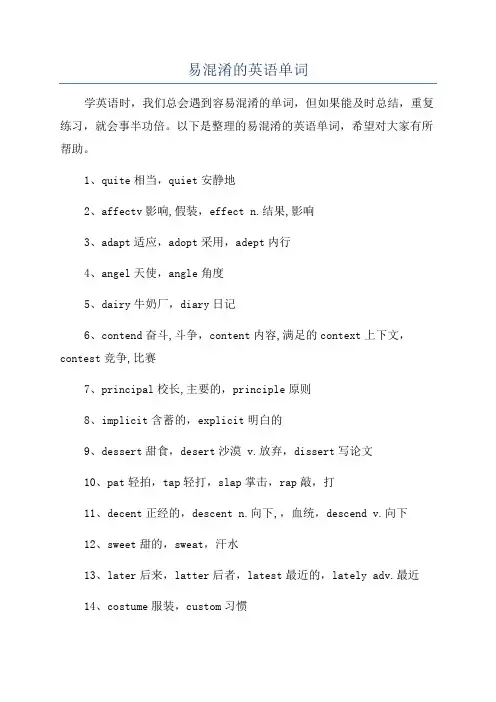
易混淆的英语单词学英语时,我们总会遇到容易混淆的单词,但如果能及时总结,重复练习,就会事半功倍。
以下是整理的易混淆的英语单词,希望对大家有所帮助。
1、quite相当,quiet安静地2、affectv影响,假装,effect n.结果,影响3、adapt适应,adopt采用,adept内行4、angel天使,angle角度5、dairy牛奶厂,diary日记6、contend奋斗,斗争,content内容,满足的context上下文,contest竞争,比赛7、principal校长,主要的,principle原则8、implicit含蓄的,explicit明白的9、dessert甜食,desert沙漠 v.放弃,dissert写论文10、pat轻拍,tap轻打,slap掌击,rap敲,打11、decent正经的,descent n.向下,,血统,descend v.向下12、sweet甜的,sweat,汗水13、later后来,latter后者,latest最近的,lately adv.最近14、costume服装,custom习惯15、extensive广泛的,intensive深刻的16、aural耳的,oral口头的17、abroad国外,aboard上(船,飞机)18、altar祭坛,alter改变19、assent同意,ascent上升,accent口音20、champion冠,champagne香槟酒,campaign战役21、baron男爵,barren不毛之地的,barn古仓22、beam梁,光束,bean,豆been,have过去式23、precede领先,proceed进行,继续24、pray祈祷,prey猎物25、chicken鸡,kitchen厨房26、monkey猴子,donkey驴27、chore家务活,chord和弦,cord细绳28、cite引用,site场所,sight视觉29、clash(金属)幢击声,crash碰幢,坠落,crush压坏31、confirm确认,conform使顺从32、contact接触,contract合同,contrast对照33、council议会,counsel忠告,consul领事34、crow乌鸦,crown王冠,clown小丑,cow牛35、dose一剂药,doze打盹36、drawndraw过去分词,drown溺水37、emigrant移民到国外,immigrant从国来的移民38、excess n.超过,exceed v.超过,excel擅长39、hotel旅店,hostel青年旅社40、latitude纬度,altitude高度,gratitude感激41、immoral不道德的,immortal不朽的42、lone孤独的,alone单独的,lonely寂寞的43、mortal会死的,metal金属,mental神经的,medal勋章,model模特meddle玩弄44、scare惊吓,scarce缺乏的45、drought天旱,draught通风,,拖,拉,draughts(英)国际跳棋47、assure保证,ensure使确定,insure保险48、except除外,expect期望,accept接受,excerpt选录,exempt免除49、floor地板,flour面粉50、incident事件,accident意外记住英语单词的技巧1、记准每个单词2、掌握记忆步骤课堂上许多学生看到单词表中的生词,首先进行的是拼写,这样在有限的时间里,很难把涉及的单词都记下来。
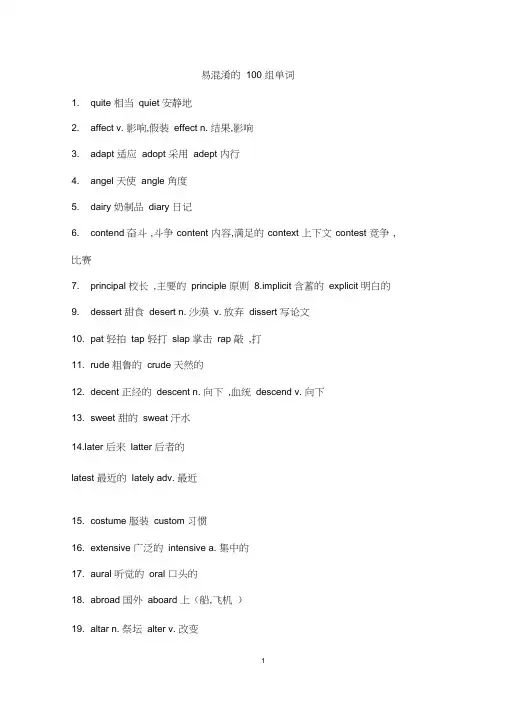
易混淆的100 组单词1. quite 相当quiet 安静地2. affect v. 影响,假装effect n. 结果,影响3. adapt 适应adopt 采用adept 内行4. angel 天使angle 角度5. dairy 奶制品diary 日记6. contend 奋斗,斗争content 内容,满足的context 上下文contest 竞争,比赛7. principal 校长,主要的principle 原则8.implicit 含蓄的explicit 明白的9. dessert 甜食desert n. 沙漠v. 放弃dissert 写论文10. pat 轻拍tap 轻打slap 掌击rap 敲,打11. rude 粗鲁的crude 天然的12. decent 正经的descent n. 向下,血统descend v. 向下13. sweet 甜的sweat 汗水ter 后来latter 后者的latest 最近的lately adv. 最近15. costume 服装custom 习惯16. extensive 广泛的intensive a. 集中的17. aural 听觉的oral 口头的18. abroad 国外aboard 上(船,飞机)19. altar n. 祭坛alter v. 改变20. assent 同意ascent 上升accent 口音21. champion 冠军champagne 香槟酒campaign 战役22. source 来源,水源sauce 酱油saucer 茶resource 资源recourse 求援23. precede 领先proceed 进行,继续24. pray 祈祷prey 猎物25. chicken 鸡kitchen 厨房26. monkey 猴子donkey 驴27. chore 家务活chord 和弦cord 细绳28. cite 引用site 场所sight 视觉29. clash (金属)碰撞声crash 撞碎,坠落crush 压坏30. compliment 赞美complement 补足物31. confirm 确认conform 符合,使顺从32. contact 接触contract 合同contrast 对照33. vocation 职业vacation 假期evocation 唤起revocation 撤回34. council 议会counsel 忠告consul 领事35. crow 乌鸦crown 王冠clown 小丑cow 牛36. dose 一剂(药) doze 打盹37. drawn draw 过去分词drown 溺水38. emigrant 移民到国外(迁出) immigrant 从某国来的移民(迁入)39. excess n. 超过exceed v. 超过excel v. 擅长40. hotel 旅馆hostel 旅社,招待所(尤指青年旅社) titude 纬度altitude 高度gratitude 感激42.immoral 不道德的immortal 不朽的43.lone 孤独alone 单独的lonely 寂寞的44. area 区域era 时代45. metal 金属mental 精神的medal 勋章model 模特meddle 管闲事46. scare 惊吓scarce 缺乏的47. drought 天旱draught 拖拉的draughts (英)国际跳棋48. assure 保证in sure 给…保险49. except 除外expect 期望accept 接受excerpt 摘录50. floor 地板flour 面粉51.incident 事件accident 意外52.inspiration 灵感aspiration 渴望53. march 三月,前进match 比赛54. patent 专利potent 强有力的potential 潜在的55. assume 假定resume 简历,重新开始56. police 警察policy 政策politics 政治57. protest 抗议protect 保护58. require 需要inquire 询问enquire 询问acquire 获得59. revenge 报仇avenge 营… 报仇60. story 故事storey 楼层store 商店61. strike 打stick 坚持strict 严格的62. expand 扩张expend 花费extend 延长63. commerce 商业commence 开始64. through 通过thorough 彻底的though 尽管thought think 过去分词65. purpose 目的suppose 假设propose 建议66. resemble 类似assemble v. 集台,装配assembly n 集台,装配67. expect 期望respect 尊敬aspect 方面inspect 视察suspect 怀疑68. glide 滑翔slide 使滑行slip 跌落69. steal 偷steel 钢70. strive 努力stride 大步走71. allusion 暗示illusion 幻觉delusion 错觉elusion 逃避72. prospect 前景perspective 透视73. stationery 文具stationary 固定的74.loose 松的lose 丢失loss n. 损失lost lose 的过去式75. amend 改正, 修正emend 修订76. capitol 美国国会大厦capital 首部77. attain 达到obtain 获得abstain 放弃78. casual 随便的causal 表原因的79. extend 延伸extent 长度extant 现存的80.inability 无能力disability 残疾81. personnel 人事部门personal 个人的82. statue 塑像statute 法令stature 身高status 地位83. widow 寡妇window 窗户84. socks 短袜stockings 长筒袜85. tax 税taxi 出租86. definite 确切的infinite 无限的87. grim 冷酷的grime 污点88. award 授予reward 奖赏89. crayon 蜡笔canyon 山谷90. recent 最近resent 生气91. phrase 短语phase 阶段92. mission 使命emission 散发.发射mansion 大厦93. vision 视觉version 译本94. gasp 喘气,气喘吁吁地说grasp 抓住95. delicate 微妙的dedicate 献身96.idle 空闲的idol 偶像97.induce 诱导deduce 推测reduce 减少seduce 诱使pse 流逝elapse 消逝eclipse 日食99.bloom 开花blossom 开花(结果实) bosom 胸100.bride 新娘bribe 贿赂。
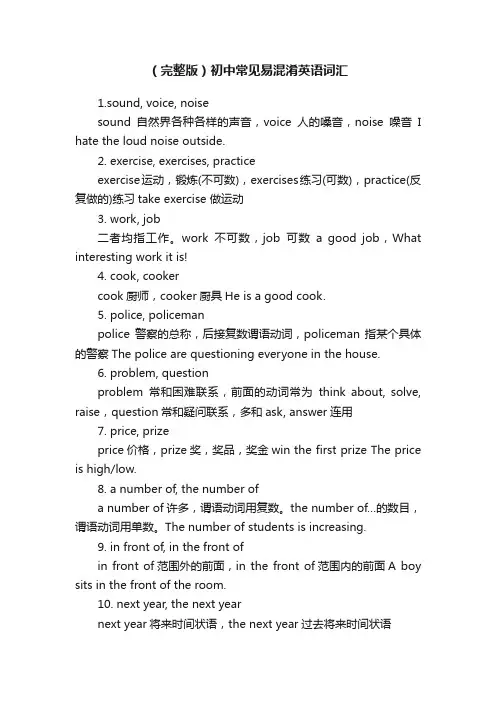
(完整版)初中常见易混淆英语词汇1.sound, voice, noisesound自然界各种各样的声音,voice人的嗓音,noise噪音I hate the loud noise outside.2. exercise, exercises, practiceexercise运动,锻炼(不可数),exercises练习(可数),practice(反复做的)练习take exercise 做运动3. work, job二者均指工作。
work不可数,job可数a good job,What interesting work it is!4. cook, cookercook厨师,cooker厨具He is a good cook.5. police, policemanpolice警察的总称,后接复数谓语动词,policeman 指某个具体的警察The police are questioning everyone in the house.6. problem, questionproblem常和困难联系,前面的动词常为think about, solve, raise,question常和疑问联系,多和ask, answer连用7. price, prizeprice价格,prize奖,奖品,奖金win the first prize The price is high/low.8. a number of, the number ofa number of许多,谓语动词用复数。
the number of…的数目,谓语动词用单数。
The number of students is increasing.9. in front of, in the front ofin front of范围外的前面,in the front of范围内的前面A boy sits in the front of the room.10. next year, the next yearnext year将来时间状语,the next year过去将来时间状语He said he would go abroad the next year.11. in bed, on the bedin bed卧在床上,on the bed在床上The book is on the bed. He is ill in bed.12. the people, a peoplethe people指人,a people指民族The Chinese is a peace-loving people.13. it, oneit同一物体,one同类不同一I lost my pen. I have to buy a new one.14. that, thisthat指代上文所提到的,this导出下文所要说的I was ill. That's why…15. none, nothing, no onenone强调有多少,nothing, no one强调有没有,nothing指物,no one指人--- How many…/How much…? --- None.16. anyone, any oneanyone指人,不能接of,any one指人/物均可,可接of, any one of you17. who, whatwho指姓名或关系,what指职业或地位What is your dad? He is a teacher.18. what, whichwhat的选择基础是无限制的,which在一定范围内进行选择Which do you prefer, bananas or apples?19. other, anotherother后接名词复数,another后接名词单数other students, another student20. many, much, a lot ofmany和可数名词连用,much和不可数名词连用,a lot of可数,不可数均可,但不用于否定句I haven't many books.21. much more…than, many more…thanmuch more…than后接形容词或不可数名词,many more…than后接可数名词many more people, much more water, much more beautiful22. no, notno=not a/any, no friend=not a/any friend, no water=not any water23. by oneself, for oneself, to oneselfby oneself单独的,独自的,for oneself为自己,to oneself供自己用的24. at all, after allat all根本,全然, after all到底,毕竟After all he is a child.25. tall, hightall常指人或动物,high常指物体He is tall.26. fast, quicklyfast侧重于指人或物体具有运动速度快的特点,quickly侧重指某事完成或发生的快run fast, answer the question quickly27. high, highlyhigh具体的高,highly抽象的高,高度的think highly of(高度赞扬)28. sleeping, asleep, sleepysleeping正在睡觉,asleep睡着,熟睡,只能做表语,sleepy困的,有睡意的a sleeping baby,The baby is asleep. I'm sleepy.29. real, truereal真的,真实的,指的是事实上存在而不是想象的,true真的,真正的,指的是事实和实际情况相符合real gold, a true story30. pleasant, pleased, pleasingpleasant常用作定语,pleased常用作表语,pleased主语常为人,a pleasant trip,be pleased with…对…感到满意/开心31. ill, sickill做表语,sick定语、表语均可a sick boy, He is sick/ill.32. good, wellgood形容词,well副词,但指身体状况是形容词He is well again.33. hard, hardlyhard努力,hardly几乎不work hard, I can hardly believe it.34. excited, excitingexcited使人兴奋的,exciting令人兴奋的I'm excited. The news is exciting.35. before long, long beforebefore long不久以后,long before很久以前36. happy, gladhappy高兴,幸福,定表均可,glad高兴,只能做表语a happy girl, I’m happy/ glad to see you.37. instead, instead ofinstead是副词,放在句首或句末,instead of是介词短语,放在句中He didn't see a film. Instead he watched TV. He watched TV instead of seeing a film.38. too much, much tootoo much 后接不可数名词,much too后接形容词much too heavy39. raise, riseraise及物动词,rise不及物动词The sun rises in the east. Raise your hand, please.40. bring, take, carry, fetchbring拿来,take带走,carry随身携带,fetch去回这一往返动作fetch a box of chalk41. spend, take, pay, costspend人做主语,花钱,花时间; s pend…on sth./(in) doing sth; take物做主语,花时间; It takes sb some time to do sth.; pay人做主语,花钱,pay for; cost物做主语,花钱;sth cost some money42. join, join in, take part injoin加入某个组织,并成为其中的一员;join in参加小型的活动, join sb. in;take part in 参加大型的活动He joined the army five years ago.43. learn, studylearn学习,侧重学习的结果,study学习,侧重学习的过程,研究study the problem44. want, hope, wishwant打算,想要,want to do, want sb. to do, hope希望(通常可以实现),hope to do/ hope that… wish希望(通常不能实现)wish (sb.) to do, wish sb/sth. + n. I wish you success.45. answer, replyanswer及物动词,reply不及物动词,后接to, reply to the letter46. leave, leave forleave离开,leave for前往He left Beijing for Shanghai.47. drop, falldrop及物\不及物均可,fall不及物动词Prices fell/dropped. He dropped his voice.48. win, lose, beatwin后接sth.,反义词为lose, beat后接sb. win the game, beat them49. live on, live bylive on以…为主食,live by靠…谋生live on fish/ live by fishing50. catch a cold, have a coldcatch a cold不能和表示"一段时间"的状语连用,而have a cold 可以She has had a cold for a week.51. change for, change intochange for调换成,change into变成Change the shirt for a bigger one. Water changes into ice.52. go for a doctor, go to a doctorgo for a doctor去请医生,go to a doctor去看病53. arrive, get, reacharrive不及物动词,后接in (大地点),at(小地点),get不及物动词后接to,reach及物动词arrive in Beijing, get to Beijing, reach Beijing54. agree with, agree to,agree with同意某人,agree to同意某事,agree with you, agree to the plan, agree to do sth55. receive, acceptreceive收到某一东西,但不一定接受,accept接受I received a gift, but I didn't accept it.56. wear, put on, dresswear和dress表状态,wear接衣服等,可用进行时,dress接人,be dressed in, put on表动作It's cold outside. Put on your warm clothes.57. listen, hearlisten强调动作,hear强调结果I listened, but I heard nothing.58. look, see, watchlook看的动作,see看的结果,watch强调所看物体的变化、移动和发展watch TV59. lie, laylie躺,位于(lay, lain),说谎(lied, lied),lay平放(laid, laid) lay the book60. turn, get, growturn表突变,后常接表颜色的词,get强调变的结果,grow强调过程,逐渐的变化turn yellow, get tired, grow big61. close, shut, turn offclose和shut当关解时可以通用,用于可开合的物体,turn off用于指有开关的物体Close/Shut the door. Turn off the TV.62. at, in (表地点)at小地点,in大地点arrive at a small village, arrive in Shanghai63. day after day, day by dayday after day日复一日(无变化);day by day一天天地(有变化)Trees grow taller day by day.64. after, in (表时间)after接时间点,in接时间段,用于将来时after 7:00, in five minutes65. between, amongbetween两者之间,三者或三者以上两两之间, among三者或三者以上之间Switzerland lies between France, Germany, Australia and Italy.66. through, acrossthrough穿越空间,across在…上穿过through the forest, across the desert67. above, on, overabove在上面,不接触,on在上面,接触,over在正上方fly over the hill68. until, not…untiluntil到…为止,not…until直到…才(常跟点动词连用)I waited until 3:00.He didn't come until 3:00.69. besides, exceptbesides除了…还(包括在内)except除了(不包括在内),70. because, because ofbecause连词,连接两句话,because of后接词或短语He didn't go to school because of his illness.71. for example, such asfor example一般只列举一个,such as列举多个例子I have been to a lot of American cities, such as New York, Atlanta and Chicago.72. All right. That's all right. That's right.All right好吧;That's all right.没关系;That's right. 那是对的---Sorry. --- That's all right.73. such…that, so…that当如此…以至于解时,such…that修饰名词,so…that修饰形容词或副词,但名词前面如果有many, much, little, few修饰用so…that,不用such thatso many people that… such a lovely boy=so lovely a boy74. Shall I…? Will you…?Shall I…? 征求对方意见或向对方请示,意为我能…吗? Will you…?请求或建议对方做某事,意为你愿意…吗? Will you help me? Yes, I will.。
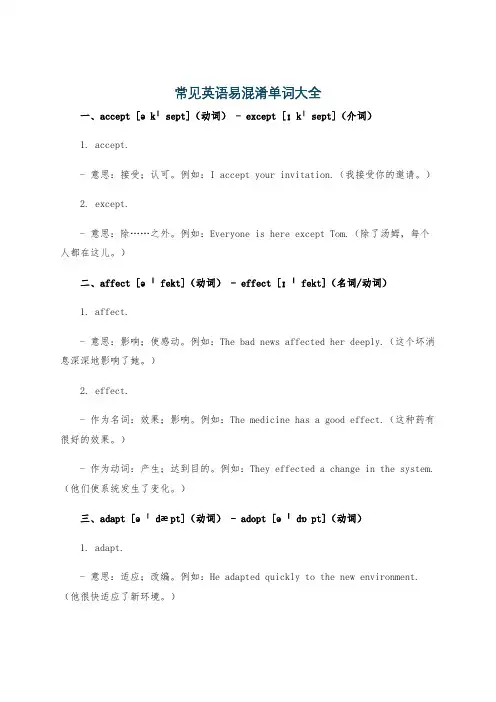
常见英语易混淆单词大全一、accept [əkˈsept](动词) - except [ɪkˈsept](介词)1. accept.- 意思:接受;认可。
例如:I accept your invitation.(我接受你的邀请。
)2. except.- 意思:除……之外。
例如:Everyone is here except Tom.(除了汤姆,每个人都在这儿。
)二、affect [əˈfekt](动词) - effect [ɪˈfekt](名词/动词)1. affect.- 意思:影响;使感动。
例如:The bad news affected her deeply.(这个坏消息深深地影响了她。
)2. effect.- 作为名词:效果;影响。
例如:The medicine has a good effect.(这种药有很好的效果。
)- 作为动词:产生;达到目的。
例如:They effected a change in the system.(他们使系统发生了变化。
)三、adapt [əˈdæpt](动词) - adopt [əˈdɒpt](动词)1. adapt.- 意思:适应;改编。
例如:He adapted quickly to the new environment.(他很快适应了新环境。
)- 例如:They adapted the novel for the film.(他们把这部小说改编成电影。
)2. adopt.- 意思:采用;收养。
例如:We should adopt a new method.(我们应该采用一种新方法。
)- 例如:They decided to adopt an orphan.(他们决定收养一个孤儿。
)四、alive [əˈlaɪv](形容词) - live [lɪv](动词) / [laɪv](形容词)1. alive.- 意思:活着的;有活力的。
只能作表语,不能作定语。

(1)French letter 避孕套,不是法国信;French似乎和爱神有很大的关系,例如说French kiss就不是普通那种只碰一下嘴唇的高雅行为,而是“使舌尖纠缠在一起的deep kiss”,进一步有用来指“上”与“下”的接吻oral intercourse,这种行为又称为French way(法国式)。
(2)go Dutch AA制,不是去荷兰;AA制--Acting Appointment,相传当年荷兰商人怕请客吃亏而发明的,等于Let's go fifty-fifty或Go Dutch,因此形成let's go dutch(让我们按荷兰人规矩做)的俗语。
AA也可是“Algebraic A verage”,意为按人头平均分担帐单。
香港人常把AA作为All Apart,意为“全部分开”,也很形象呀!(3)drawing room 不是画室,而是客厅living room 就是客厅,在英国又称之为sitting room,主要是普罗阶层的说法。
豪门贵族的客厅则称之为drawing room,但这里和画画没关系。
从前贵族客厅乃男士高谈阔论的地方,女性和小孩通常都会回避。
所以drawing room其实是withdrawing room的简称。
(4)full of beans 不是到处都是豆子,是精力充沛bean 通常指四季豆,大概是豆子营养丰富的原因,所以full of beans 意为精力充沛。
不过在美国俚语中另有“错误连篇”的意思。
(5)on the couch 不一定是坐在沙发上,是看心理医师couch就是sofa,看心理医师的时候,病人躺下来谈话的长椅也couch,所以on the couch 也有看心理医师的意思。
Spending months on the couch delving into childhood traumas.是“花几个月看心理医师,探索童年的心灵创伤”的意思。
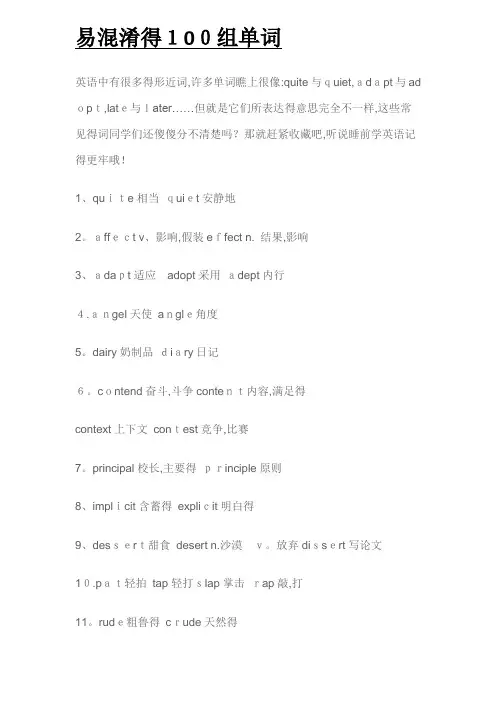
易混淆得100组单词英语中有很多得形近词,许多单词瞧上很像:quite与quiet,adapt与ad opt,late与later……但就是它们所表达得意思完全不一样,这些常见得词同学们还傻傻分不清楚吗?那就赶紧收藏吧,听说睡前学英语记得更牢哦!1、quite相当quiet安静地2。
affect v、影响,假装effect n. 结果,影响3、adapt适应adopt采用adept内行4.angel天使angle角度5。
dairy奶制品diary日记6。
contend奋斗,斗争content内容,满足得context上下文contest竞争,比赛7。
principal校长,主要得principle原则8、implicit含蓄得explicit明白得9、dessert甜食desert n.沙漠v。
放弃dissert写论文10.pat轻拍tap轻打slap掌击rap敲,打11。
rude粗鲁得crude天然得12、decent正经得descent n。
向下,血统descend v.向下13.sweet甜得sweat汗水14.later后来latter后者得latest最近得lately adv、最近15。
costume服装custom习惯16.extensive广泛得intensive a.集中得17。
aural听觉得oral口头得18、abroad国外aboard上(船,飞机)19、altar n.祭坛alterv。
改变20。
assent同意ascent上升accent口音21.champion冠军champagne香槟酒campaign战役22.source来源,水源sauce酱油saucer茶resource资源recourse 求援23。
precede领先proceed进行,继续24、pray祈祷prey猎物25。
chicken鸡kitchen厨房26。
monkey猴子donkey驴27。
chore家务活chord与弦cord细绳28。
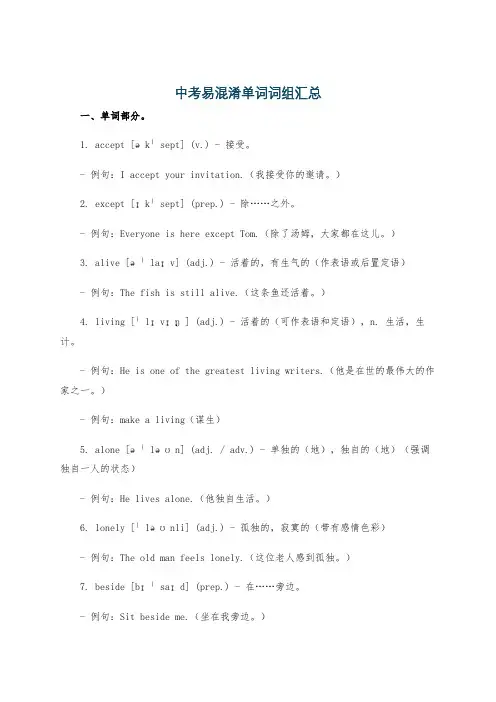
中考易混淆单词词组汇总一、单词部分。
1. accept [əkˈsept] (v.) - 接受。
- 例句:I accept your invitation.(我接受你的邀请。
)2. except [ɪkˈsept] (prep.) - 除……之外。
- 例句:Everyone is here except Tom.(除了汤姆,大家都在这儿。
)3. alive [əˈlaɪv] (adj.) - 活着的,有生气的(作表语或后置定语)- 例句:The fish is still alive.(这条鱼还活着。
)4. living [ˈlɪvɪŋ] (adj.) - 活着的(可作表语和定语),n. 生活,生计。
- 例句:He is one of the greatest living writers.(他是在世的最伟大的作家之一。
)- 例句:make a living(谋生)5. alone [əˈləʊn] (adj. / adv.) - 单独的(地),独自的(地)(强调独自一人的状态)- 例句:He lives alone.(他独自生活。
)6. lonely [ˈləʊnli] (adj.) - 孤独的,寂寞的(带有感情色彩)- 例句:The old man feels lonely.(这位老人感到孤独。
)7. beside [bɪˈsaɪd] (prep.) - 在……旁边。
- 例句:Sit beside me.(坐在我旁边。
)8. besides [bɪˈsaɪdz] (prep. / adv.) - 除……之外(还有),此外。
- 例句:Besides English, we also learn French.(除了英语,我们还学法语。
)- 例句:I don't like this dress. Besides, it's too expensive.(我不喜欢这条裙子。
它太贵了。
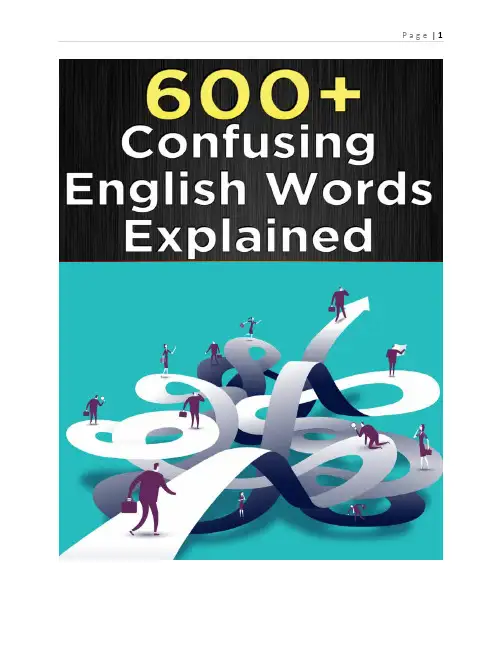
Table of ContentsIntroductionThe English language has an enormous vocabulary, and this results in many words that are very similar. Some of them are different by just one letter, like moral and morale. Others differ in their spelling and pronunciation, like incite and insight.There are many pairs of words that appear to mean the same thing – such as historic and historical, or definitely and definitively – but actually have different definitions and uses.It can be very confusing for you as an English learner!You want to speak correctly and avoid miscommunications, but you’re not quite sure about the exact meaning and use of each word. Some students even avoid using particular words because of their doubts.This book aims to clarify more than 600 of the most common confusing words in English. Every entry has various example sentences s that you can see how each word is normally used.To learn the most from this book, I would suggest trying to write your own example sentences after reading each entry. This will help establish the meaning of the words firmly in your mind, so that you won’t forget them.Best wishes.a / an / oneUse one when the number is important; when you want to emphasize that it is only one (and not two or three or more):∙One of these eggs is rotten, but the others are OK.∙I wanted to buy three CDs, but I didn’t have enough money, so I bought only one.In all other cases, when the fact of being “one” is not important, use a / an:∙I had an omelet for breakfast.∙I bought a new CD yesterday.What about the difference between a and an? We use an before words beginning with a vowel sound, and a before all other words:∙an apple / a banana∙an ice cream cone / a piece of cake∙an egg / a carrot∙an omelet / a steak∙an umbrella / a uniform(because “uniform” is pronounced yuniform)∙an hour / a hat(we use an with hour because the H in hour is silent, but the H in hat is not)able / capableThe difference between these words is extremely small – but usually we use able to describe current things someone can do,and capable to talk about someone’s future potential. It is not a strict rule, just a general tendency.∙She’s able to play a song perfectly after hearing it only once.(she can currently do this)∙She’s capable of becoming a successful musician.(she has the possibility of doing this in the future)∙This technology has the ability to grow crops in the desert.(it can currently do this)∙This technology has the capability to end world hunger.(it has the possibility of doing this in the future)The opposite of able is unable, and the opposite of capable is incapable.∙The disease made him unable to move without pain.(he currently cannot move without pain)∙The treatments are incapable of curing the disease.(there is no possibility of curing the disease with the treatments)Note that we say able to, but capable of:∙The martial artist is able to break a concrete block with his bare hands.∙Good thing he’s very calm –I don’t think he’s capable of violence.accident / incidentYou may hear the words accident and incident to refer to events in the news. These words are easy to confuse, but they are not exactly the same! Incident is more general, and accident is more specific.Incident can refer to any event - big or small, good or bad, intentional or unintentional. A bank robbery, a funny or controversial situation, an argument between celebrities, etc. - all can be described as incidents.An accident is a bad event caused by error or by chance. Accidents are always unintentional, and they usually result in some damage or injury. A car crash is one example of an accident. If some equipment malfunctions in a factory and injures the workers, that is also an accident. Examples of very minor accidents are when you step on someone's foot or spill your coffee on someone else. You didn't want or plan to do it.All accidents can ALSO be described as incidents – but not all incidents are accidents.If a drunk driver runs his car into a group of people, that is an accident (he did not intend to do it; it was caused by alcohol and by chance). It could also be described as an incident ("The incident occurred on Main Street at around 2:30 AM").If some troublemaking teenagers throw rocks at a house and break its windows, that is an incident (an event) but not an accident (because they did it on purpose; they intended to do it).accurate / exact / preciseThe word exact means that something is perfectly correct.∙an exact replica/copy∙someone’s exact words; the exact wording/phrase∙exact measurements∙an exact amount∙the exact date/time/placeThe word accurate can mean "perfectly correct" as well, but it can also mean "almost correct; correct enough to be useful."∙an accurate number, measurement, calculation= a correct number, measurement, calculation∙an accurate description, information, translation, prediction, estimate, memory= completely or mostly correct; any tiny differences from the truth are notsignificant enough to matterWe can use adverbs of degree with the word accurate:∙Something can be extremely/perfectly/totally accurate– this means it is perfectly correct, it is exact.∙Something can be reasonably/generally/largely/pretty/fairly accurate–this means it is not perfectly correct; there are some mistakes, but it is correct in general.The word precise also means "perfectly correct":∙the precise wording of the contract= the same words contained in the contract∙precise measurements = measurements that are correct∙at that precise moment = at exactly that momentIt has an additional meaning that is "clearly expressed" or "carefully distinct"∙ a precise description = a clear and detailed description∙precise directions = clear and detailed directions∙Can you be more precise? = Can you say it more clearly and specifically?ache / pain / hurtAn ache is discomfort that continues for some time. It is usually associated with a specific part of the body, such as a headache, a stomachache, a toothache, and an earache. After you exercise, the next day your muscles will probably ache. An ache is usually not extremely strong, so you can try to ignore it.Pain is usually stronger, more sudden, and more difficult to ignore. You would feel pain when you cut yourself or hit your head on something. If you exercise and you injure yourself – break a bone or tear a muscle – you would feel a sudden pain.We also have the expression “aches and pains,” which describes general and various physical discomforts. Your 90-year-old grandfather might complain about all the “aches and pains” he has at his age!Hurt is a little different because it is usually used as an adjective or verb, not a noun. To describe an ache or a pain, you could say:∙My ankle hurts. = I have a pain/ache in my ankle.∙My neck hurts. = I have a pain/ache in my neck.∙My shoulders hurt. = I have a pain/ache in my shoulders.Hurt is also used to mean “injure”:∙Don’t play with that knife – you could hurt yourself.∙He was badly hurt in the car accident.Finally, all three of these words can be used to refer to emotional pain as well as physical pain:∙My son is in prison; the situation is causing me a lot of heartache.(heartache = emotional anguish)∙It took her years to move past the pain of her divorce.(pain = emotional injury)∙I was extremely hurt that he didn’t invite me to his wedding.(hurt = upset, sad)actual / current / presentActual is very different from current and present.Current and present refer to things happening now (not in the past or future). Actual refers to things that are true (not things that are false).∙The current unemployment rate is 8%.= the rate now∙This article claims that unemployment is at 5%, but the actual rate is around 8%. = the correct rate∙Barack Obama is currently the president of the United States.= he is the president now∙The language spoken in Brazil is actually Portuguese, not Spanish.= “actually” is used to make a correction. Portuguese is the true languagespoken in BrazilNow, what about current and present? These two words are usually the same. Sometimes, current is used in the sense of "generally now" and present is often used more in the sense of "immediately now, in this place/moment."∙My girlfriend currently lives in New York, but she’s in Los Ange les at present.= in general, she is in New York, but at this very moment, she is in Los Angeles.∙The current situation is good, but the present case is an emergency.= in general the situation is good nowadays, but right now we have anemergencyAt present always means "now." But there can be some confusion with the word presently, which can mean "now" or "very soon."∙He will be here presently.= He will be here very soon.∙She is presently working on a new project.= She is working on a new project right now.You can know which meaning it has by the verbs: if presently is used with "will," then it means "very soon in the future." If presently is used with "is/are" or other verbs in the present tense, then it means "now."administrator / boss / managerA manager is somebody who has a level of control and responsibility over other people in a company or organization. For example, in a small clothing store, the salespeople would be responsible for selling clothes and helping customers... and the manager would be responsible for making the salespeople's schedule, organizing the store's finances, training new salespeople, and resolving any problems among the employees.The word boss simply refers to the person above you in the company hierarchy. Let's say we have a company with a:∙President∙Vice-president∙Director∙Manager∙EmployeesIf you are one of the employees, then the manager is your boss. If you are the director, then the vice-president is your boss.Your boss is the person supervising you, who may be responsible for evaluating your work or giving approval for certain decisions.An administrator is simply a person who does administrative work (working with documents, paperwork, information and data, etc.) An administrator can also be a manager or boss if he or she is the leader of a team of employees... or an administrator can simply be a regular employee.adverse / averseThe word adverse refers to something that is opposing – it goes against what you want, and is often unfavorable, harmful or challenging.∙Heavy rain, high winds, or icy roads are adverse weather conditions (because they interfere with the operation of normal life and transportation).∙If a medicine makes the patient’s health get worse, not better, it is having an adverse effect.∙If a decision has adverse consequences, it means that the results are opposite from what you wanted.Some people pronounce this word AD – verse, and others pronounce it ad – VERSE.We often use the noun form, adversity, for difficult conditions. Someone who grew up in a very poor family and later became very financially successful has overcome adversity.While the word adverse describes a situation, the word averse describes people, and it means the person is not willing to do something:∙If your parents want everything to stay the same, they are averse to change.∙Someone who doesn’t think it’s a good idea to invest money in the stock market is averse to risk.The noun form is aversion, and it also refers to a strong dislike or unwillingness to do something. If you have an aversion to broccoli, it means you really don’t like broccoli and are not likely to eat it.advice / adviseAdvice is a noun, and advise is a verb:∙She gave me some good advice.∙She advised me to get some rest.There’s also a pronunciation difference:advice has an “S” sound, and advise has a “Z” sound.Don’t make the common error of saying “advices” – the word advice is uncountable. However, you can say “pieces of advice”:∙The consultant gave me three pieces of advice for my business.affect / effectAffect is a verb used for the process of one thing causing another thing to change. Effect is a noun, and it means the end result of some change.∙This disease is affecting my ability to breathe.∙The medicine had an instant effect on the pain.In spoken English, affect and effect are pronounced the same.afraid / scared / frightenedWhen using these words to describe someone’s emotionalstate – after the ve rb “to be” and before “of” – you can useafraid or scared with no change in meaning.∙She’s afraid of spiders. = She’s scared of spiders.“Frightened of” can also be used, but it’s not as common.However, when used in the active voice, and the SUBJECT of the sentence is the scary thing, you can use only scared or frightened:∙The loud noise scared me.∙The loud noise frightened me.You can also use scary or frightening to describe something that causes fear:∙It was a scary experience.∙It was a frightening experience.after / laterUse after + phrase, and use later alone (at the end of a sentence or phrase).∙I'll call you later.I'll call you after I get home from work.∙First he bought a new car. Two weeks later, he bought a new motorcycle.He bought a new motorcycle two weeks after he bought a car.You can say "later + time period" to refer to an unspecified time in the future, which is still within the period, for example:∙I'll finish the project later this week.∙We'll go on vacation later this year.Never end a sentence with "after." Instead, you can use "afterwards"∙"Did you go straight home after the baseball game?""No, we went out for drinks after.""No, we went out for drinks afterwards."agenda / itinerary / scheduleAn agenda is a list or program of things to be done. Workers who are well-organized will often have an agenda for meetings – a list of specific topics to discuss, or things to accomplish during the meeting.If something is "on the agenda" or "on your agenda," it means that people are willing to discuss it or work on it.We also have the expression "a hidden agenda," meaning a secret plan that you are hiding by pretending you have a different intention.Some people also use the word agenda to mean their calendar. If someone asks if you are free for lunch next week, you might say, "Let me check my agenda" to find out which day you are available.The word itinerary is a list or plan of things to do during a trip. On an organized tour, the travel agency will give the travelers an itinerary describing the different places they will go and things they will see.A schedule is a list of things to be done at a certain time. A conference, for example, might have a schedule like this:∙Breakfast 7-9 AM∙Main speaker 9-10:30 AM∙Workshop 11-12∙Lunch 12-2 PMPublic transportation like buses and trains also have schedules. Another word for schedule, when used as a noun, is "timetable."Schedules can also be for long-term projects - the schedule defines what tasks must be done by a certain date. For example, the construction of a building: ∙Lay the foundation - by Feb. 1∙Build the structure - by July 1∙Install the electrical systems - by August 1When referring to longer-term projects, another word for schedule is timeline.If something is done or progressing faster than expected, it is "ahead of schedule" - and if something is delayed, it is "behind schedule."Finally, the word schedule can be used as a verb for establishing an appointment or action at a certain time, for example: "I scheduled my dentist appointment for next Thursday."ago / back / beforeAgo and back are used for past times from the present moment:∙I graduated from high school ten years ago.(ten years in the past from today)∙We sent the package three days ago.(three days in the past from today)∙I moved here about five years back.(informal – five years in the past from today)Before and earlier are used for past times from another time in the past. Here are some examples:∙Yesterday I missed my train. I got to the train station at 7:10, but the train had left ten minutes before. (or ten minutes earlier)(= ten minutes before 7:10 yesterday)∙I was very happy when I got this job last January, because I had lost my previous job six months before. (or six months earlier).(= six months before last January)aid / assist / helpThere is no difference in meaning between these three words, but there are some slight differences in the way they fit in the sentence.Help is the most common and most informal (aid and assist are both more formal).Aid is more commonly used as a noun, not a verb:∙ a hearing aid is a small electronic device that helps people with hearing problems to hear better∙first aid is the initial medical care given immediately after an accident or injury∙government aid is official help from the government∙humanitarian aid is helping people who are suffering after a disaster, or suffering from disease, poverty, or warThere is also a word aide (pronounced the same way!) which refers to a person whose task is to help - an assistant. A nurse's aide, a teacher's aide, etc.Now let's look at the two verbs: help and assist.After help, we can use a verb with or without "to":∙He helped me understand the lesson.= He helped me to understand the lesson.∙Can you help us carry these books?= Can you help us to carry these books?In everyday spoken English, it's probably more common not to use "to."After assist, we must use in + -ING form of the verb or with + noun:∙I'm happy to assist you in creating a website.I'm happy to assist you with your website.∙This program assists people in finding a job.This program assists people with their job search.The noun form of help is also help, but the noun form of assist is assistance:∙Thank you for your help.∙Thank you for your assistance.Thank you for your assist.∙I'm so grateful for all the help I've received from the team.∙I'm so grateful for all the assistance I've received from the team.aim / goal / objectiveMany people use these words interchangeably; there is really very little difference between them. In everyday spoken English, the most common word is goal.Aim and objective are usually used in more formal writing.One small difference is that an objective is more specific than a goal, for example: ∙Our goal is to improve health care for children.general∙Our objective is to provide 10,000 children with vaccines.specificHowever, in casual conversation, most people would use goal for both general and specific things:∙My goal is to lose weight.∙My goal is to lose 20 pounds by the summer.The words goal and objective are nouns, and the word aim can be a noun or a verb: ∙The aim of this project is to increase our students' motivation.aim = noun∙We're aiming to increase our students' motivation.aim = verbalien / foreigner / strangerA stranger is a person you don't know:∙When I was a child, my mother taught me not to get into a car with a stranger.∙When my car broke down, a kind stranger stopped to help me.A foreigner is someone who comes from another country:∙This town is a popular tourist destination, so there are always a lot of foreigners around.∙The new law makes it easier for foreigners to get documents to work legally.∙ A lot of foreigners have been moving into this neighborhood –I’ve met people from seven different countries in my apartment building alone!The word alien is a legal term for foreigner. It is usually used to describe "illegal aliens" (people who are in the country illegally) or "resident aliens" (people who are living in the country legally). Again, this is formal/legal language and in everyday speaking it's best to use foreigner.Alien also refers to creatures from other planets; it isanother word for extraterrestrial.alive / life / liveThe word l-i-v-e has two pronunciations:The verb live (with the "i" sound in "sit") means to reside:∙I live in a small house.∙She lives in France.The adjective live (with the "i" sound in "like") has a few different meanings. When music or a TV broadcast is happening in real time (it was not previously recorded):∙There's live music at the bar on Friday nights.∙We're bringing you the latest news live fromWashington D.C.When an animal is alive, not dead:∙He found a live snake in his tent.The word life is also pronounced with the "i" in "like" and is a noun:∙I'm reading a book about the life of Albert Einstein.∙Do you think there's life on other planets?∙He has faced many difficulties in his life.The plural of life is lives:∙My parents are planning to live in Florida for the rest of their lives.∙Thousands of lives were lost in the war.The word alive is an adjective, and it also means "not dead":∙It's amazing he was still alive after being in the desert without water for four days.∙The oldest person alive is currently 124 years old.already / yetBoth yet and already are used with the present perfect tense.∙Already is usually used in positive sentences.∙Yet is usually used in questions and negative sentences.Imagine that you and your friend are going to travel. There are many things to do, and you ask your friend if he has done these things:∙Have you bought the tickets yet?∙Have you arranged a taxi yet?∙Have you reserved the hotel room yet?∙Have you packed the bags yet?In all the examples, use yet at the end of the question. Your friend might answer:∙Yes, I’ve already bought the tickets.∙Yes, I’ve already arranged a taxi.∙No, I haven’t reserved the room yet.∙No, I haven’t packed the bags yet.Use already in the positive answers, and yet in the negative answers.There is one time you can use already in questions: it’s when something happens earlier than expected. If your son finishes his homework in just 15 minutes, you could ask: “Have you already finished you r homework?!” because you were expecting it to take more time.all / whole / everyUse every with SINGULAR, countable nouns:∙I exercise every day.∙Every student in the class has a computer.∙Every necklace in this store costs more than $1,000.Use all with PLURAL nouns OR with uncountable nouns to mean 100% of many things:∙All of the students in the class have computers.∙All of the necklaces in this store are expensive.∙All of this furniture is new.= many pieces of furnitureWhen talking about time, there is a difference between every day and all day. If you study every day, it means you study on Monday, Tuesday, Wednesday, Thursday, Friday, Saturday, and Sunday. If you study all day, it means you study from early in the morning until late at night.Use whole (less formal) or entire (more formal) with uncountable or singular countable nouns to mean 100% of one thing:∙I ate the whole pizza.= 100% of one pizza.∙I finished reading the entire book in three days.=100% of one book.Here are more examples that show the difference between all and whole/entire: ∙I ate the entire cupcake.= 100% of one cupcake.∙I ate all the cupcakes.= 100% of many cupcakes∙The whole apple is rotten.= 100% of one apple.∙All the fruit is rotten.= 100% of many apples, bananas,grapes, etc.all of / each ofWe use each to talk about objects individually, and all to talk about objects as a group:∙The teacher gave a different task to each student.(“each” emphasizes the individuality of the members of the group)∙The teacher gave tests to all the students.(“all” emphasizes the students as a group)In a similar way, each of the members of a group emphasizes them as individuals, and all of the members of a group emphasizes them as a whole:∙Each of these chairs is hand-crafted.∙All of the chairs are made in a factory.∙The doctor spends an hour with each of the patients.∙All of the patients think he’s a great doctor.With “each,” we ALWAYS use the singular form of the verb:∙Each of these chairs are is hand-crafted.= Each chair is hand-crafted.∙Each of the patients were was seen by the doctor.= Each patient was seen by the doctor.Sentences with “all of” use the singular form of the verb if the noun is singular, and the plural form of the verb if the noun is plural:∙All of the beer is imported.(beer = singular)∙All of the bottles are recyclable.(bottles = plural)∙All your advice was excellent.(advice = singular)∙All your suggestions were excellent.(suggestions = plural)all ready / already / all right / alrightAll ready and all right (two words) mean that everything is ready or everything is correct / OK:∙The students are all ready for the test.= All the students are ready for the test.∙Your answers are all right.= All your answers are right.Already means that something happened earlier than expected:∙He’s only 14 and he’s already graduated from high school –he’s a ge nius!∙The repairs on my car are finished already? Wow, that was fast.∙You don’t have to wash the dishes –I’ve already done it.All right can also mean OK/uninjured, acceptable, or average.∙Are you all right?= Are you OK? (after someone falls down and may have injured themselves)∙If it’s all right with you, we’ll reschedule the meeting.= If it’s acceptable to you∙The food at that restaurant is all right.= Average; not especially great, but not bad eitherAlright is a variant of “all right” that is not considered correct, even though many people use it informally.allow / let / permitThese verbs all have the same meaning. The difference is in their grammatical structure:LET + PERSON/THING + VERB (base form –without “to”)Examples:∙I don’t let my kids watch violent movies.∙Mary’s father won’t let her adopt a puppy because he’s allergic to dogs.∙Our boss doesn’t let us eat lunch at our desks; we have to eat in the cafeteria.∙Oops! I wasn’t paying attention while cooking, and I let the food burn.∙Don’t let the advertising expenses surpass $1000.The simple past tense of let is also let; there is no change!The verbs allow and permit are more formal ways to say “let.” However, with allow and permit, we use to + verb:∙I don’t allow my kids to watch violent movies.∙Our boss doesn’t permit us to eat lunch at our desks.Permit is the most formal, let is the least formal, and allow is in the middle.With permit and allow, we can also say that something is or is notpermitted/allowed:∙Smoking is not allowed.∙Employees are allowed to take a one-hour lunch break.∙Passengers are not permitted to use cell phones duringtakeoff.∙With a tourist visa, you are permitted to stay in thecountry for 90 days.allude / eludeIf you allude to something, it means you refer to it indirectly, without saying it specifically. For example, if there is a software program with lots of bugs and errors, the developer might allude to the problems by saying “The process of developing the software has been very challenging.” – He does not mention the problems, but he hints at them by describing the development as “challenging.”If someone has just received a promotion, they might allude to it by saying they’re happy about recent events at work. Again, the person didn’t specifically say “I’mh appy because I got a promotion,” they just referred to it very indirectly.The word elude means to avoid or escape from something – we often talk about criminals eluding the police or eluding capture.。
容易混淆的单词汇总(不断更新)disease [di’zi:z] n:疾病decease [di’si:s] n.【U】死, 死亡daily ['deili] adj.每日的, 日常的adv.每日, 天天n.日报(复)dailies:工作样片diary ['daiəri] n. 日记, 日记簿dairy ['dεəri, 'deri] n.牛奶场, 乳品店, 乳制品, 地方小店adj.牛奶的, 乳制品的stale [steil] adj.不新鲜的, 陈腐的, 厌倦的v.变得不新鲜, 腐坏,(动物)撒尿n.(动物的)尿stake [steik] n.桩, 赌注, 利害关系v.用桩支撑, 下注stalk [stɔ:k] n.茎, 梗n.跟踪,高视阔步v.悄悄靠近, 跟踪, 蔓延, 高视阔步地走stable ['steibl] adj.稳定的, 安定的, 可靠的n.马棚, 马厩, 一批人v.使(马)入厩, 入厩persecuate ['pə:sikju:t, 'pə:si.kju:t] vt. 迫害, 烦扰, 为难prosecuate ['prɔsikju:t, 'prɔsi.kju:t] vt.起诉, 告发, 从事,彻底进行vi.起诉, 担任检察官lime [laim] n.石灰, 粘鸟胶n.酸橙, 酸橙树vt.施石灰,涂上粘性物质,沾上粘鸟胶adj.石灰的adj. 与石灰或石灰石相关的limb [lim] n.肢体, 枝干, 树枝vt.肢解n.边缘lame [leim] adj.无说服力的, 跛足的vt.使... 成残废n.金属薄板lamp [læmp] n. 灯, 台灯, 油灯, 光源lamb [læm] n.小羊, 羔羊肉, 羔羊, 温顺的人vi.产羊羔lam [læm] v.打, 鞭笞,脱逃n.<俚> 逃亡lump [lʌmp] n.块, 团, 笨重的人,瘤v.使成块, 形成团状,归并, (笨重地)移动adj.块状的,全部的, 整体的fog [fɔg] n.雾, 朦胧, 迷惑v.以雾笼罩, 使模糊, 迷惑frog [frɔg] n. 蛙, 嗓音沙哑, 马的蹄叉, 刀剑的挂环flag [flæg] n.旗, 旗帜, 信号旗vt.(以旗子)标出v.无力地下垂, 减退, 枯萎n.香蒲,鸢尾n.石板vt.(以石板)铺路evolution [.i:və'lu:ʃən, .evə'lu:ʃən] n. 进化, 发展, 演变revolution [.revə'lu:ʃən] n. 革命, 变革, 重大改变, 旋转revelation [rɛvl'eiʃən, revəl'eiʃən] n. 揭露, 泄露, 发觉, 启示protest ['prəutest,prə'test] n.抗议, 反对v.抗议, 反对, 申明protect [prə'tekt] v. 保护, 投保recipe ['resipi, 'resəpi] n. 秘诀, 食谱, 药方receipt [ri'si:t] n.收据, 收条, 收到v.出收据recession [ri'seʃən] n. 后退, (经济)不景气reception [ri'sepʃən] n. 接待, 反应, 接待处, 欢迎, 接收, 招待会assess [ə'ses] v. 评定, 评估, 估算access ['ækses] n.入口, 通道n.接近(的机会), 使用之权vt.进入, (电脑)存取essay ['esei,e'sei] n.论文, 短评, 散文, 试图vt.尝试assay [ə'sei] n. 化验, 分析v. 化验, 分析petrol ['petrəl] n. 汽油patrol [pə'trəul] n.巡逻, 巡查v.巡逻, 巡查faint [feint] adj.微弱的, 无力的, 模糊的v.昏倒n.昏厥,昏倒feint [feint] n.伪装, 佯装攻击v.佯攻, 佯击adj.(纸等)印有隐格线的rug [rʌg] n. 地毯, 毯子, 旅行毯rag [ræg] n.破布, 碎布, 破衣服, (低劣的)报纸n.恶作剧n.石板瓦,坚硬的石灰岩n.散拍乐曲vt.嘲笑, 戏弄rub [rʌb] v.擦, 摩擦, 搓, 惹恼n.困难, 障碍, 擦weed [wi:d] n.杂草, 野草n.衣服,丧服vi.除草, 清除, 淘汰衣服, 丧服weep [wi:p] v.流泪, 哭泣, 悲叹, 渗出n.哭泣, <俚>眼泪desert ['dezət,di'zə:t] n.沙漠, 荒地, 应得(的惩罚或奖励) v.遗弃, 离弃, 放弃, 擅离职守dessert [di'zə:t] n.甜食deserve [di'zə:v] vt. 应受, 值得contact ['kɔntækt, 'kɔntækt,kən'tækt] n.接触, 联系, 熟人v.(与)联系, (与)接触adj.接触的contest ['kɔntest,kən'test] n.竞赛, 比赛vt.驳斥, 争取vi.奋斗context ['kɔntekst] n. 上下文, 环境, 背景contrast ['kɔntræst,kən'træst, 'kɔn.træst,kən'træst] n.对比, 差别, 对照物v.对比, 成对照n.[计算机] 反差contract ['kɔntrækt,kən'trækt] n.合同, 婚约, 合约, 契约v.缩小, 订合同, 缩短, 感染疾病, 招致coral ['kɔrəl] n.珊瑚adj.珊瑚的, 珊瑚色的coal [kəul] n.煤, 木炭vt.烧成炭,供应煤vi.加煤, 装煤vain [vein] adj. 自负的, 徒劳的, 无效的, 虚荣的vein [vein] n.静脉, 纹理, 叶脉, 岩脉vt.使有脉络,用脉络装饰n.风格, 情绪, 气质, 倾向rein [rein] n.缰绳, 驾驭, 控制vt.控制, 驾驭vi.驾驭rain [rein] n.雨, 雨水v.下雨, (雨点般)落下canoe [kə'nu:] n.独木舟v.乘独木舟, 用独木舟运cannon ['kænən] n.大炮, 机关炮v.开炮,相撞canal [kə'næl] n.运河, 沟渠, 气管,食管vt.建运河, 疏导quit [kwit] v.停止, 离开, 退出, 辞职n.辞职adj.摆脱的, 自由的quite [kwait] adv. 相当, 完全, 十分, 很, 不太quiet ['kwaiət] adj.安静的, 宁静的, 平静的n.安静, 平静, 闲适vt.使平静, 使安心vi.平静下来quick [kwik] adj.迅速的, 快的, 机敏的adv.迅速地, 快n.本质, 皮下(尤指指甲下)细嫩或敏感的肉creek [kri:k] n. 小湾, 小溪Creek n. 克里克族, 克里克人, 克里克语creep [kri:p] vi.蹑手蹑脚地走, 爬, 渐渐出现, 蔓延, 毛骨悚然n.卑鄙小人, 爬,徐行,蠕动cheek [tʃi:k] n.面颊, 脸蛋n.屁股, 厚颜无耻vt.粗鲁地向...讲compliment ['kɔmplimənt, 'kɔmpləmənt] n.称赞, 恭维, (复数)致意vt.恭维, 称赞complement ['kɔmplimənt, 'kɔmplə.ment,'kɔmpləmənt] vt.相辅相成n.补足物, 补语, 余角blank [blæŋk] adj.空白的, 茫然的n.空白, 空白处vi.消失, 走神vt.使模糊不清, 删除, 封锁,(比赛时)阻止...得分bland [blænd] adj. 温和的, 不油腻的, 引不起兴趣的, 平淡无奇的flank [flæŋk] n.侧面, 侧腹, 腰窝肉v.攻击侧面,守侧面,位于…侧面fra nk [fræŋk] adj.坦白的, 直率的, 真诚的vt.免费邮寄,使自由出入n.免费邮寄lag [læg] v.落后, 减退, 缓慢进行n.落后, 时间间隔n.保温层,木桶板vt.装隔热层于n.<英> 罪犯,刑期vt.<英> 逮捕leg [leg] n.腿vi.用脚走路n.支柱, (旅程的)一段, 一段赛程, [数]直角边lap [læp] n.膝部, (衣服的)下摆,控制范围n.重叠部分,(跑道的)一圈n.舐, (波浪)拍打声v.包围,(使)重叠, 领先一圈v.舔食,轻拍tag [tæg] n.标签, 附属物,捉人游戏, 谚语, 名称vt.连接, 附以签条, 尾随,添饰, 指责vi.紧随, 尾随tap [tæp] n.龙头, 塞子, 窃听n.轻拍, 轻敲, 鞋掌v.轻拍, 轻击, 补鞋掌,选择v.开发, 利用, 索要, 装龙头,窃听tab [tæb] n.[计算机]制表键, 选项卡, 标签, 垂饰, 拉环, 账单v.用标签或垂饰安装tow [təu] v.拖, 拉, 牵引n.拖, 拽,拖绳n.短麻屑town [taun] n.城市, 城镇, (某一城镇的)居民, 商业区towel ['tauəl] n.毛巾, 手巾v.用毛巾擦tower ['tauə] n.塔, 高楼vi.高耸, 胜过bow [bəu,bau] n.弓, 鞠躬礼, 蝴蝶结, 船头v.鞠躬, 致敬, 压弯bowel ['bauəl] n. 肠, 内部bowl [bəul] n.碗, 碗状物,圆形露天剧场, 季后赛n.木球,保龄球v.投球, 打保龄球dawn [dɔ:n]n.黎明, 曙光, 开端, 破晓vi.开始出现, 破晓, 逐渐明白down [daun] adv.向下prep.沿着... 而下adj.向下的,消沉的, 无礼的n.绒毛, 汗毛v.击倒, 打败, 吞下, 被抑制drown [draun] vi.淹死vt.淹死, 淹没dive [daiv]n.潜水, 跳水vt.跳水, 俯冲vi.把... 伸入drive [draiv] vt.开车, 驱赶, 迫使n.驾车, 驱使, 推进力, 路, 快车道,街,[计]驱动器dose [dəus]n.剂量, 一剂, 一服vt.给... 服药n.<俚>花柳病does [dʌz] do的第三人称单数assemble [ə'sembl, ə'sembəl] v. 集合, 收集, 装配resemble [ri'zembl, ri'zembəl] v. 与…相似, 像illuminate [i'lju:mineit, i'lu:mə.neit] vt. 照明, 阐释, 说明eliminate [i'limineit, i'limə.neit] v. 除去, 剔除, 忽略, 淘汰sign [sain] n.手势, 招牌, 符号, 迹象, 正负号v.签, 签名, 做手势, 做标记sigh [sai] n.叹气, 叹息v.叹息, 惋惜sight [sait] n.视力, 看见, 视线, 景物v.瞄准, 看见, 观测though [ðəu] conj.虽然, 尽管, 然而, 可是adv.(用在句末补充说明使语气减弱)不过thought [θɔ:t] n.思想, 想法, 意向, 思念, 观念, 打算, 关心, 顾虑动词think的过去式和过去分词through [θru:] adv.通过, 径直, 自始至终, (电话)接通, 完全prep.穿过, 凭借, 一直到adj.直达的, 直通的, 贯穿的, 完成的, 结束的decree [di'kri:] n.法令, 判决v.颁布, 裁定, 注定degree [di'gri:] n. 学位, 程度, 度数agree [ə'gri:] v. 同意, 赞成, 承认, 符合, 一致aggress [ə'gres] vi. 攻击, 侵犯stool [stu:l] n.凳子, 搁脚凳, 便桶, 大便vi.引诱steel [sti:l] n.钢铁, 钢制品, 钢铁般的性质vt.使坚强, 使... 硬如钢, 使下定决心adj.钢的, 坚强的steal [sti:l] v.偷, 窃取n.偷窃, 便宜货, (欺诈的)政治交易stoop [stu:p] n.佝偻, 弯腰, 屈尊,俯冲v.弯腰, 屈服, 佝偻, 屈尊,降格, 俯冲n.门廊steep [sti:p] adj.险峻的, 陡峭的, (价格)过高的v.浸泡steer [stiə] v.操纵, 驾驶, 掌舵, 引导n.(食用的)公牛n.暗示sheer [ʃiə] adj.极轻薄的, 陡峭的, 全然的adv.垂直地v.避开, 转向n. 转向, (甲板的)脊弧, 透明薄织物carve [kɑ:v] v. 雕刻, 切割crave [kreiv] v. 渴望, 热望, 迫切需要, 恳求cave [keiv] n.洞穴, 山洞v.挖空,塌落, 屈服swift [swift] adj.快的, 迅速的, 敏捷的n.雨燕, 线轴Swiftn.斯威夫特(人名)adv. 快速地shift [ʃift] v.移动, 改变, 换挡, 字型转换n.轮班, 变化, 移动, 计谋, 轮班职工scarce [skɛəs]adj.缺乏的, 不足的, 稀少的, 罕见的adv.勉强scare [skɛə] v.受惊吓, 恐吓, 吓走n.惊吓, 惊恐dispute [di'spju:t] v.争论, 辩驳, 争议, 质疑n.争论, 争端, 争吵depute [di'pju:t] v. 委任, 委托, 派... 为代表或代理repute [ri'pju:t] n.名声, 名气, 声望v.认为,以为hunch [hʌntʃ] n.预感, 块, 肉峰v.弯腰驼背bunch [bʌntʃ] n.串, 束, 一群, 捆n.突出物,凸起vt.使成一束(或一群等) vi.隆起, 成束成群punch [pʌntʃ] vt.按(键), 以拳重击, 开洞, 剪票n.殴打n.打洞器,钻孔机n.感染力n.(酒、水、糖等制成的)鸡尾酒qualify ['kwɔlifai, 'kwɔlə.fai] vt.使具备资格, 描述, [语]修饰vi.取得资格, 合格quality ['kwɔliti, 'kwɔləti] n.品质, 才能, 特质adj.高品质的, <英俚>棒极了piece [pi:s] n.件, 篇, 片, 块, 作品vt.修补, 拼凑pierce[piəs] v.刺穿, 穿透, 洞悉Pierce n.皮尔斯(人名)aspect ['æspekt] n. 方面, 方位, 外观;外貌inspect [in'spekt] v. 检查, 视察aspire [əs'paiə, ə'spaiə] v.热望, 立志inspire [in'spair, in'spaiə] vt.鼓舞, 激发, 产生, 赋予...灵感vi.吸入swarm [swɔ:m] n.群, 蜂群v.云集, 充满swamp[ swɔmp] n.沼泽, 湿地, 困境v.淹没, 使陷于困境,使忙于应付swan [swɔn] n.天鹅vi.闲荡, 游荡demo ['deməu] n. 样本唱片, 演示, <口>示威demon ['di:mən] n. 魔鬼, 恶魔, 精力充沛的人, 高手strike [straik] n.罢工, 打击, 殴打v.打, 撞, 罢工, 划燃stroke [strəuk] n.中风, 击打, 一笔(画), 意外的运气v.击打v.轻抚, 奉承distinguish [di'stiŋgwiʃ] vt. 区别, 辨认, 使显著extinguish [iks'tiŋgwiʃ, ik'stiŋgwiʃ] vt. 熄灭, 扑灭, 消灭, 使破灭, 偿清source [sɔ:s, sɔrs] n.来源, 发源地, 原始资料v.从...获得sauce [sɔ:s] n.酱汁, 调味汁, <口>无礼vt.给... 调味, 使... 增加趣味, 对 ... 无礼particulate [pə'tikjulit, pə'tikjə.leit] adj. 微粒的n. 微粒状物质particular [pə'tikjulə, pə'tikjələ] adj.特定的, 专指的,特殊的, 特别的, 挑剔的n.详情,细节participate [pɑ:'tisipeit, pɑ:'tisə.peit] vi.参加, 参与vt.分享particle ['pɑ:tikl, 'pɑ:tikəl] n. 颗粒, 微粒, 极小量, 质点, 粒子, [语]小品词participle ['pɑ:tisipl, 'pɑ:təsəpəl] n. 分词principle ['prinsəpl, 'prinsəpəl] n. 原理, 原则, 主义, 信念principal ['prinsəpəl] adj.主要的, 首要的n.本金, 资本, 校长, 主角, 委托人, 主犯instinct ['instiŋkt,'instiŋkt,in'stiŋkt] n.直觉, 本能, 天性adj.充满的distinct [di'stiŋkt] adj.明显的, 清晰的, 不同的instant ['instənt] n.瞬间, 立即adj.立即的, 即时的, 速成的distant ['distənt] adj.疏远的, 遥远的, 远房的, 陌生的, 远行的lip [lip] n.嘴唇, 唇状物v.接吻,说话, 拍打n.边, <俚>唐突无礼的话adj.不真诚的lid [lid] n.盖子, 眼睑vt.给... 装盖子n.限制, 遮盖, <俚>帽子,一盎司的大麻lap [læp] n.膝部, (衣服的)下摆,控制范围n.重叠部分,(跑道的)一圈n.舐, (波浪)拍打声v.包围,(使)重叠, 领先一圈v.舔食,轻拍pitch [pitʃ] n.球场, 程度, 音调, 推销, 投掷,街头商贩摊位,沥青, 树脂, 松脂v.投, 颠簸, 搭帐篷, 定调, 推销, 用沥青覆盖patch [pætʃ] n.小片, 补丁vt.修补, 补缀n.<俚>呆子bitch [bitʃ] n.母狗, (贬)泼妇v.埋怨, 搞砸ditch [ditʃ] n.沟渠, 壕沟n.丢弃, 坠入沟中, 飞机(在海上)迫降vi.挖渠,飞机紧急降落scrape [skreip] v.刮掉, 擦掉n.擦伤, 擦掉,刮擦声, <口>窘境scrap [skræp] n.碎片, 废品, 少许, 瘦小的人, 争斗, 打架v.报废, 舍弃, 打架n. 打架adj. 零碎的scribe [skraib] n.抄写员, 书记员, 作家, 新闻记者, 划线器v.抄写, 划线ascribe [ə'skraib] v. 归因于, 归于script [skript] n.剧本, 脚本, 手稿, 手迹, 字体, 考卷vt.把...改编为剧本grid [grid] n. 格子, 栅栏, 电网, 网格, 赛车起跑线grip [grip] n.紧握, 手提包, 了解, 手柄vt.吸引, 紧抓exterminate [eks'tə:mineit, ik'stə:mə.neit] vt. 消灭, 扑灭, 根绝determinate [di'tə:minit, di'tə:mənit] adj. 确定的, 决定的, 限定的basket['bɑ:skit, 'bæskit] n.篮, 篓, 筐, [篮]球篮, 投篮得分n.滑雪杆支架bracket ['brækit] n.档次, 括号, 支架vt.支撑, 放在括号内, 归入一类stationary ['steiʃənəri, 'steiʃən.eri] adj.不动的(稳定的) n.固定物(驻军)stationery ['steiʃənəri, 'steiʃən.eri] n. 文具, 信笺stride [straid] n.大步走, 一大步, 步伐, 进步vt.跨, 跨骑vi.迈大步走, 跨过, 分腿站立strife [straif] n. 争吵, 冲突, 倾轧, 竞争n. <古>奋斗, 努力retire [ri'taiə] v.退休, 撤退, 离去, 就寝, 主动退出比赛n.退休, 退职entire [in'taiə] adj. 全部的, 完整的, 全面的nude [nju:d] adj.(尤指艺术人像)裸的, 与生俱有的,无装饰的n.裸体画、裸体人像(尤指绘画、摄影)nuke [nju:k] n.核武器, 核能发电厂v.以核武器攻击bustle ['bʌsl, 'bʌsəl] n.喧哗, 匆忙, <旧>裙撑,衬垫v.匆忙, 催促bristle ['brisl, 'brisəl] n.刚毛, 猪鬃v.生气, 直立defend [di'fend] v.防守, 防护, 辩护depend [di'pend] vi.依赖, 依靠, 取决于descent [di'sent] n. 下降, 下坡, 家世, 血统, 侵袭, 衰落, 继承decent ['di:snt, 'di:sənt] adj. 相当好的, 体面的, 适当的, 正派的puncture ['pʌŋktʃə] n.刺穿, 刺孔v.刺穿, 削弱punctual ['pʌŋktjuəl, 'pʌŋktʃuəl] adj.准时的, 严守时刻的, 正点的asset ['æset] n. 资产, 优点, 有用的东西assert [ə'sə:t] vt. 断言, 主张, 生效fuss [fʌs] n.大惊小怪, 小题大作, 强烈不满或争吵vi.无事自扰, 焦急,对小事激动vt.扰乱, 使焦躁fuse [fju:z] n.保险丝, 导火线, 引线vt.熔化, 融合, 装导线,装引信于vi.熔化, 融合reject [ri'dʒekt, 'ridʒekt,ri'dʒekt] vt.拒绝, 排斥, 驳回, 丢弃n.不合格产品, 被拒之人eject [i'dʒekt] v.喷射, 放逐, 驱逐omit [əu'mit] vt.省略, 遗漏, 忘记, 删去emit [i'mit] vt.发出, 放射, 吐露infect [in'fekt] vt.传染, 感染inflect [in'flekt] v. 弯曲, 改变, 使屈曲meter ['mi:tə] n.公尺, 米n.计量器, 计时器vt.(用仪表)测量n.节拍, 韵律metro ['metrəu] n.地铁adj.大都市的(METRO)麦德隆metric ['metrik] adj.公制的, 米制的, 十进制的n.标准, 度量meteor ['mi:tiə] n. 流星, 大气现象abbr. 气象学(=meteorology)simulate ['simjuleit, 'simjə.leit] vt.假装, 模拟, 模仿stimulate ['stimjuleit, 'stimjə.leit] vt.刺激, 激励, 鼓舞vi.起刺激作用deflect [di'flekt] v.使偏斜, 转向, 改变原计划defect [di'fekt] n.缺点, 缺陷vi.背叛defeat [di'fi:t] n.挫败, 败北vt.战胜, 击败, 使...不能实现tickle ['tikl, 'tikəl] vt.使发痒, 逗乐, 使快乐vi.觉得痒n.痒, 抓痒tackle ['tækl, 'tækəl] v.处理, 对付, 阻截(对方球员) n.滑车,用具, 铲球, (美式足球)拦截手immense [i'mens] adj. 巨大的, 广大的, <口>非常好的immerse [i'mə:s] vt. 浸, 陷入riddle ['ridl, 'ridəl] n.谜, 谜语vt.解谜, 出谜题,充满,打洞, 筛选vi.出谜题saddle ['sædl, 'sædəl] n.鞍, 车座, 山脊,当权vt.装以马鞍, 使负担vi.装马鞍paddle ['pædl, 'pædəl] n.桨, 划桨, 明轮翼v.划桨, 戏水, 抚弄ladle ['leidl, 'leidəl] n.杓子, 长柄杓v.以杓舀取rope [rəup] n.绳索, 一串, 绞刑v.捆绑, 说服(口)robe [rəub] n.长袍v.(使)穿上长袍cope [kəup] vi.应付, 对抗, 妥善处理vt.笼罩, 盖上斗篷n.长袍, 斗篷状物contend [kən'tend] v.竞争, 争斗, 争辩,坚决主张content ['kɔntent,kən'tent] n. 内容, 目录, 含量adj. 满足的, 满意的vt. 使... 满足, 使... 安心violet ['vaiəlit] n.紫罗兰, 紫色adj.紫色的violate ['vaiəleit, 'vaiə.leit] v.侵犯, 违反, 扰乱, 亵渎, 强奸violent ['vaiələnt] adj.猛烈的, 强烈的, 暴力的, 极端的throne [θrəun] n.王位, 君主throng [θrɔ:ŋ, θrɔ:ŋ,θrɔŋ] n.人群, 一大群, 大量v.群集, 挤满modulate ['mɔdjuleit, 'mɔdʒə.leit] v.调整,调节(声音,变调moderate ['mɔdəreit,'mɔdərit] adj.适度的,温和的,稳健的,中等的v.节制,使.稳定/缓和n.稳健的flake [fleik] n.薄片, 小片, 火花v.剥落fake [feik] adj.假的n.骗子, 假货, 欺骗vt.伪造, 伪装vi.假造preach [pri:tʃ] vt.讲道, 说教vi.传道, 训诫peach [pi:tʃ] n.桃子, 桃树, 桃红色n.<俚>受人欢迎的人或物v.揭发, 检举bleach [bli:tʃ] n.漂白剂, 漂白v.变白, 漂白beach [bi:tʃ] n.海滩, 海滨, 沙滩vt.拖(船)上岸rifle ['raifl, 'raifəl] n. 步枪v. 洗劫, 抢劫trifle ['traifl, 'traifəl] n.琐事, 少量v.浪费, 玩弄graze [greiz] v.放牧, (牛、羊等)吃草v.轻擦, 擦伤n.放牧n.擦伤gaze [geiz] vi.凝视n.凝视derive [di'raiv] v.获取, 得自, 起源deprive [di'praiv] vt.剥夺, 失去, 免职divine [di'vain, də'vain] adj.神圣的, 神的vt.推断vi.预言, 理解n.牧师, 神学家trial ['traiəl n.审讯, 试验, 试用, 尝试, 预赛或选拔赛,讨厌的事, 惹麻烦的人v.测试trail [treil] n.踪迹, 小径, 尾,一系列vi.拖, 落后于vt.追踪, 拖拽, 尾随mash [mæʃ] n. 麦芽浆, 糊状物, 土豆泥v. 把... 捣成糊状v. 挑逗, 调情marsh [mɑ:ʃ] n. 沼泽, 湿地Marsh:马什(人名)mesh [meʃ] n.网孔, 网状物, 罗网,[机]啮合vt.使匹配,以网捕捉,使啮合vi.被网缠住,互相协调, 啮合aura ['ɔ:rə, 'ɔrə] n.气氛, 氛围, 气味, 光环, [医]先兆aurora [ɔ:'rɔ:rə, ɔ'rəurə] n.曙光, 极光Auroran.[罗神]黎明的女神aural ['ɔ:rəl, 'ɔrəl] adj.听觉的, 耳的rural ['ru:rəl, 'rurəl] adj.农村的lore [lɔ:, ləur] n.学问, 知识, 传说, (鸟等的)眼端lure [lu, luə] vt.诱惑, 吸引n.诱惑, 吸引力, 饵adopt [ə'dɔpt] v.采用, 收养, 接受adapt [ə'dæpt] vt.改编, 使适应vi.适应, 适合yoke [jəuk] n.轭, 轭状物,共轭牛, 束缚, 纽带,(女)上衣抵肩、裙腰vt.把... 套上轭, 使结合, 使成配偶vi.紧密联结yolk [jəuk] n.蛋黄cathode ['kæθəud] n.阴极Catholic ['kæθəlik] adj.天主教的, (catholic)普遍的, 广泛的n.天主教cathedral [kə'θi:drəl] n. 大教堂plastic ['plæstik] n.塑料, 塑料制品, 信用卡adj.塑料的, 可塑的, 造型的, 易受影响的, 整形的plaster ['plɑ:stə] n.石膏, 灰泥, 膏药v.涂以灰泥, 敷以膏药, 使... 平marry ['mæri] v. 娶,结婚,嫁,结合merry ['meri] adj. 愉快的, 欢乐的, <口>微醉的cheese [tʃi:z] n.干酪, 乳酪, 奶酪vt.使停止n.<俚> 要人chess [tʃes] n.国际象棋cheer [tʃiə] n.欢呼, 激励, 愉快vt.鼓舞, 加油, 快活起来vi.欢呼, 使振奋chest [tʃest] n.胸部, 胸腔, 箱子, 金库n. 橱子brisk [brisk] adj.敏锐的, 活泼的, 活跃的, 轻快的, 凛冽的v.(使)轻快brick [brik] n.砖, 砖块, 砖状物vt.用砖围砌(或堵)n.好心人row [rəu,rau] n.排, 划船, 路, 吵闹v.划船, 将...排成排,吵架raw [rɔ:] adj.未加工的, 生的, 原始的, 湿冷的n.触到某人的痛处edge [edʒ] n.边缘, 优势, 边, 刀口vt.给... 加上边, 缓慢横过, 使锋利vi.徐徐前进hedge [hedʒ] n.树篱, 篱笆, 障碍, 防护物, 套期保值, 推诿v.用树篱围, 避免直接回答, 两面下注pledge [pledʒ] vt.发誓, 保证, 以... 抵押, 向... 祝酒n.保证, 抵押, 誓言, 抵押品wedge [wedʒ] n.楔子, 楔形物vt.楔住, 嵌, 挤进fort [fɔ:t, fəurt] n. 堡垒, 要塞fork [fɔ:k] n.叉, 叉状物vi.分叉vt.使成叉形, 用叉叉起ford [fɔ:d, fəurd] v.涉过, 涉水n.浅滩Fordn.福特汽车, 福特(人名)naughty ['nɔ:ti] adj.顽皮的, 淘气的, 不妥的haughty ['hɔ:ti] adj.傲慢的, 自大的,骄傲的flow [fləu] n.流动, 涨潮, 流, 流量vi.流动, 涌出, 飘动, 流畅vt.淹没flaw [flɔ:] n.瑕疵, 缺陷, 破绽, 裂缝v.使破裂, 有瑕疵n.一阵强风detest [di'test] v.厌恶, 痛恨detect [di'tekt] v.发觉, 察觉, 探测dependent [di'pendənt] adj.依靠的, 依赖的, 从属的n.受援助者(dependant [di'pendənt] n. 受抚养者, 侍从, 眷属;=dependent)defendant [di'fendənt] n.被告alder ['ɔ:ldə] n. [植]赤杨, 桤木elder ['eldə] adj.年龄较大的, 年长的n.长者, 长辈, [植]接骨木dare [dɛə] vt.敢, 挑战, 冒...的风险vi.勇于, 胆敢v.aux.胆敢n.胆量, 挑战dear [diə] adj.亲爱的, 宝贵的, 昂贵的n.可爱的人, 亲爱的人adv.高价地int.啊, 哎呀(用以表示惊奇、害怕以及其他强烈感情)retrospect ['retrəu.spekt] n. 回顾, 追溯v. 回顾, 回想, 追溯n. <古>对症, 参照adj. =retrospective 回顾过去的introspect[.intrəu'spekt] v. 内省, 反省spin [spin] v.(使)旋转, 疾驰, 纺织, 结网, 眩晕n.纺织, 旋转, 眩晕, 疾驰span [spæn] n.时期, 跨度, 间距vt.延续, 横跨, 贯穿, 遍及, 弥补动词spin的过去式形式n.共轭动物knob [nɔb] n.旋钮, 把手, 瘤,节, 圆丘knot [nɔt] n.结, 节vi.打结vt.把... 打成结, 系牢, 捆扎n.难题, 节(=海里/小时), 一小群knit [nit] v.编织, 密接, 结合, 皱眉n.编织rupture ['rʌptʃə] n.破裂, 断裂, [医]疝气v.(使)破裂rapture ['ræptʃə] n.狂喜v.使狂喜vocation [vəu'keiʃən] n.职业, 行业, 使命vacation [vei'keiʃən, və'keiʃən,vei'keiʃən] n.假期, 休假, 腾出vi.度假vacant ['veikənt] adj.空虚的, 空的, 木然的avocation [.ævəu'keiʃən, .ævə'keiʃən] n. 消遣, 副业, 嗜好borrow ['bɔrəu] v.借, 借鉴, 抄袭burrow ['bʌrəu, 'bə:əu] n. (兔子等)所掘的地洞vt. 挖掘(洞穴), 钻进vi. 翻寻, 挖洞wonder ['wʌndə] n.惊奇, 惊愕,奇迹v.惊奇, 想知道, 怀疑adj.奇妙的, 非凡的wander ['wɔndə] vi.漫步, 蜿蜒, 迷路, 闲逛, 徘徊vt.漫步于n.漫游, 徘徊, 闲逛impart [im'pɑ:t] vt. 传授, 赋予, 告知import ['impɔ:t,im'pɔ:t] n.进口, 意义, 进口商品v.进口, 输入impost ['impəust] n.税,关税, 拱墩v.分类估税impact ['impækt,im'pækt] n.影响,冲击力,撞击vt.挤入,压紧,撞击,对.发生影响vi.冲击,撞击,产生影响haze [heiz] n.薄雾, 迷糊vi.变模糊vt.戏弄hazel ['heizl, 'heizəl] n. 榛木, 淡褐色adj. 淡褐色的, 榛木的gasp [gɑ:sp] v.喘气, 喘息, 渴望n.喘气grasp [grɑ:sp] n.把握, 领会, 抓紧vt.领会, 抓住, 紧握leather ['leðə] n.皮革, 皮制品adj.皮革制的vt.用皮鞭抽打, 用皮革覆盖feather ['feðə] n.羽毛, 翎毛,种类vt.用羽毛装饰vi.长出羽毛slam [slæm] v.砰地关上, 猛放, 猛烈攻击n.砰然声, 猛烈抨击n.满贯clam [klæm] n.蛤, 沉默寡言的人vi.保持沉默, 挖蚌clamp [klæmp] n.夹子, 螺丝钳vt.夹住, 强加, 压制ally [ə'lai] n.同盟国, 同盟者, 伙伴v.(使)结盟, (使)联合rally ['ræli] n.集会,(价值)回升, 回合vi.重整旗鼓,恢复精神,(人)集合起来vt.嘲弄,重新召集,激励strip [strip] v.剥去, 剥夺, 脱衣, 除去n.脱衣舞, 长条, 条状stripe [straip] n.条纹, 条纹布, 种类, 军士军阶n.鞭打,抽打vt.使... 带有条纹motion ['məuʃən] n.移动, 动作, 打手势,示意, 提议, 大便v.示意, 运动, 向... 打手势notion ['nəuʃən] n. 观念, 概念, 想法, 主张prefer [pri'fə:] vt.宁可, 较喜欢, 提出(控告)refer [ri'fə:] vt.把... 提交, 把... 归因, 归类vi.参考, 谈及, 咨询defer [di'fə:] v.推迟, 延期, 使延期入伍v.顺从, 把…委托给他人confer [kən'fə:] v.商讨, 授予, 赠予vary ['vɛəri, 'veri] v. 改变, 变化, 使多样化wary ['wɛəri, 'weri] adj. 小心的, 机警的very ['veri] adv.很, 完全, 正是adj.恰好的, 同一的, 真正的, 最...的convex ['kɔn'veks, 'kɔnveks] adj. 中凸的, 凸圆的, 凸面的n. 凸状, 凸面体, 凸透镜convey [kən'vei] vt.表达, 传达, 运输, 转移vt.[律]让与soup [su:p] n.汤, 羹v.增大威力n.困境soap [səup] n.肥皂, 肥皂剧vt.用肥皂洗, 阿谀奉承lodge [lɔdʒ] n.小屋, 巢穴, 门房, 传达室, 支部v.存放, 临时住宿, 安顿, 提出(报告、抗议等) dodge [dɔdʒ] v.避开, 躲避n.躲避, 诡计bucket ['bʌkit] n.【C】水桶, (机器上的)桶装物,大量vi.颠簸行进, 下倾盆大雨vt.装在桶里buckle ['bʌkl, 'bʌkəl] n.扣子, 皮带扣v.扣住, 弯曲, 专心做事, 屈服trap [træp] n.圈套, 陷阱, 困境, 双轮轻便马车, U(或S)型管道;防臭瓣v.设圈套, 陷入(困境)trip [trip] n.旅行, 摔倒, 差错,轻快的步伐vt.使跌倒, 使失败,使犯错,起锚,竖帆vi.绊倒, 旅行, 轻快地走, 失误, 结巴beam [bi:m] vi.微笑, 发光vt.播送, 发射, 用梁支撑n.桁条,光线, (光线的)束, (横)梁n.[体]平衡木bean [bi:n] n.豆, 豆科植物n.<口>毫无价值的东西vt.击...的头部team [ti:m] n.队, 组v.使相配, 使合作, 结成一队adj.团队的teem [ti:m] v. 充满, 富于, 把……倒空, 倾泻resent [ri'zent] vt.恨, 生气recent ['ri:snt, 'ri:sənt] adj.近来的, 新近的lessen ['lesn, 'lesən] v.减少, 减轻lesson ['lesn, 'lesən] n.教训, 课vt.教训, 给... 上课induce [in'dju:s] vt.引起, 促使, 劝服, 引诱reduce [ri'dju:s] v.减少, 缩小, 使落魄, 简化, 还原endure [in'djuə] vt.容忍vi.忍耐, 持久, 持续pasture ['pæstʃ, 'pæstʃə,'pɑ:stʃə] n. 牧场, 草原vi. 吃草vt. 放牧posture ['pɔstʃə] n.姿势, 态度, 情形v.作... 姿势, 摆架子luster ['lʌstə] n.光彩, 荣誉,光泽v.使... 发光辉,有光泽,发亮cluster ['klʌstə] n.群, 簇, 丛, 串v.群集, 丛生, 使成群conscious ['kɔnʃəs] adj.神志清醒的, 意识到的, 自觉的, 有意的n.意识conscience ['kɔnʃəns] n. 良心, 是非之心, 顾忌conciseness [kən'saisnis] n. 简洁, 简明tile [tail] n.瓷砖, 瓦片v.盖瓦,铺瓷砖tilt [tilt] vt.(使)倾斜vi.抨击, 争论n.倾斜, 车盖,以全速, (小舟、车辆、地摊等的)帐蓬stilt [stilt] n. 高跷, 桩子, 支柱vague [veig] adj.不明确的, 模糊的, 茫然的, 犹豫不决的vogue [vəug] n.时尚, 流行cheat [tʃi:t] vt.欺骗, 骗取vi.作弊, 行骗n.骗子, 欺骗cheap [tʃi:p] adj.便宜的, 廉价的adv.便宜地hobby ['hɔbi] n.业余爱好lobby ['lɔbi] n.大厅, 民众接待厅,游说议员者v.游说fervor [.fə:və] n. 热诚, 热心=fervour(英)favor ['feivə] n.偏爱, 好意, 特权, 赞成vt.偏爱, 给予, 支持, 关心, 利于, 长得像flavor ['fleivə] n.风味, 特殊的滋味, 风格, 调味品vt.加调料于..., 给...添加情趣haunt [hɔ:nt] n. 常到的地方vt. 缠住, 常到, 出没(像鬼魂一样) vi. 徘徊, 出没(像鬼魂一样) daunt [dɔ:nt] vt. 使... 胆怯, 恐吓snag [snæg] n.(隐伏的)障碍, 困难, 残桩, 划破处, 抽丝处v.划破, 碰到(暗礁或枯树上),清除(暗礁等), 迅速抓到snug [snʌg] adj.温暖舒适的, 合身的, 安全的v.使整洁干净, 舒适地依靠,紧贴n.<英>酒吧里的私房panel ['pænl, 'pænəl] n.嵌板, 仪表盘, 面板, 座谈小组v.嵌镶专门问题小组pane [pein] n. 窗玻璃, 方框, 方格v. 嵌窗玻璃retail ['ri:teil] n.零售vt.零售, 传述adv.以零售形式adj.零售的detail ['di:teil, 'di:teil,di'teil] n.细节, 琐事, 枝节vt.详述, 详细说明n.(军队中的)支队rear [riə] adj.后面的, 后方的, 背面的n.后部, 尾部, 后方v.举起, 养育, 饲养rare [rɛə] adj. 罕见的, 珍贵的, 煎得嫩的sly [slai] adj. 狡猾的, 会心的, 淘气的, 诡异的shy [ʃai] adj.腼腆的, 胆怯的, 害羞的v.惊退, 受惊v.投掷n.惊退n.投掷hatchery ['hætʃəri] n. 孵卵处hatchet ['hætʃit] n. 短柄小斧, 战斧butcher ['butʃə] n.屠夫, 刽子手, 肉商, 小贩vt.屠宰, 滥杀, 将某事弄得一团糟leap [li:p] v.跳跃, 跃过, 跃n.跳跃, 跃reap [ri:p] vt.收割, 收获, 获得vi.收割celebrate ['selibreit, 'selə.breit] v. 庆祝, 庆贺, 颂扬celebrity [si'lebriti, si'lebrəti] n. 名人, 名誉, 社会名流celebrated ['selibreitid, 'selə.breitid] adj.著名的,声誉卓著的;动词celebrate的过去式/过去分词elicit [i'lisit] vt. 引出, 诱出, 探出explicit [iks'plisit, ik'splisit] adj. 明确的, 清晰的, 清楚的, 露骨的arid ['ærid] adj. 干燥的, 不毛的, 枯燥的, 无趣的, 没有生气的avid ['ævid] adj. 渴望的, 贪婪的, 热心的expand [iks'pænd; ik'spænd] v. 使... 膨胀,详述,扩张,增加,张开expend [iks'pend; ik'spend] vt. 花费,消耗skim [skim] vt. 撇去,略读,掠过,滑过vi. 掠过,表面凝结,<俚>瞒报n. 浮沫,略读,脱脂物skimp [skimp] v. 舍不得给,节省,克扣,敷衍adj. 少的,不足的foment [fəu'ment] v. 煽动,引发,激起,[医]热敷ferment ['fə:ment; 'fə:ment,fə:'ment] n. 发酵,酵素,动乱v. (使)发酵,动乱venue['venju:] n. 审判地,集合地,会场,体育场馆,犯罪地点Venus['vi:nəs] n. 金星,[罗神]维纳斯moral ['mɔrəl] adj. 道德的,精神上的n. 寓意,道德,品行,伦理mural ['mjuərəl; 'mjurəl] adj. 墙壁的,挂在墙壁上的n. 壁画emergence [i'mə:dʒəns] n. 出现,浮现,露出emergency [i'mə:dʒənsi] n. 突发事件,紧急状态adj. 应急的,紧急的,备用的insult ['insʌlt,in'sʌlt] n. 侮辱,辱骂vt. 侮辱,辱骂,凌辱result [ri'zʌlt] n. 结果,成果,答案,成绩,(足球比赛)赢v. 产生,致使consult [kən'sʌlt] v. 查阅,请教,商讨,就诊staff [stɑ:f] n. 员工,全体人员,全体职员,拐杖,杆,棒,五线谱vt. 配备员工stuff [stʌf] n. 东西,原料,材料n. 素质,本质,废物vt. 塞满,填满stiff [stif] adj. 硬的,僵直的,艰难的,生硬的,拘谨的,烈性的adv. 极其,僵硬地n. 死尸,流浪汉,过于拘谨的人,吝啬鬼,醉鬼vt. 不给小费,诈骗,失信conflict ['kɔnflikt; 'kɔnflikt,kən'flikt] n. 冲突,战斗,矛盾,斗争vi. 冲突,抵触,争执inflict [in'flikt] vt. 使遭受,施以,加害,折磨boon [bu:n] n. 恩惠,所感激的事adj. 合得来的boom [bu:m] n. 繁荣,兴旺,激增,低沉声n. 帆杠,吊杆,支臂,尾桁,水栅vi. 急速增长,发出低沉声vt. 使兴旺,促进broom [bru:m] n. 扫帚,金雀花vt. 清扫bloom [blu:m] n. 花,开花,最佳时期,花期v. 开花,繁盛n. 锻铁块,块钢n. 粉衣,粉霜blossom ['blɔsəm] n. 花,开花,全盛期vi. 开花,成长inflict [in'flikt] vt. 使遭受,施以,加害,折磨conflict ['kɔnflikt; 'kɔnflikt,kən'flikt] n. 冲突,战斗,矛盾,斗争vi. 冲突,抵触,争执大家平常学习时,学会加以积累,包括我课上的举例,假以时日,词汇量就能大大增加,提高四六级通过率。
小学易混淆英语单词整理不够细心的同学总会把一些类似的英语单词混淆在一起,下面店铺为大家带来小学易混淆英语单词整理,欢迎大家学习!小学易混淆英语单词整理:1.quite 相当 quiet 安静地2.affect v 影响, 假装 effect n 结果, 影响3.adapt 适应 adopt 采用 adept 内行4.angel 天使 angle 角度5.dairy 牛奶厂 diary 日记6.contend 奋斗, 斗争 content 内容, 满足的7.context 上下文 contest 竞争, 比赛8.principal 校长, 主要的 principle 原则9.implicit 含蓄的 explicit 明白的10.dessert 甜食 desert 沙漠 v 放弃11.pat 轻拍 tap 轻打 slap 掌击 rap 敲,打12.descent n 向下, 血统 descend v 向下13.sweet 甜的 sweat 汗水ter 后来 latter 后者15.extensive 广泛的 intensive 深刻的16.aural 听力的 oral 口头的17.abroad 国外 aboard 上(船,飞机)18.altar 祭坛 alter 改变19.assent 同意 ascent 上升 accent 口音20.pray 祈祷 prey 猎物21.chicken 鸡 kitchen 厨房22.monkey 猴子 donkey 驴23.chore 家务活 chord 和弦24.clash (金属)幢击声 crash 碰幢,坠落 crush 压坏pliment 赞美 complement 附加物26.confirm 确认 conform 使顺从27.contact 接触 contract 合同 contrast 对照28.council 议会 counsel 忠告 consul 领事29.crow 乌鸦 crown 王冠30.dose 一剂药 doze 打盹31.drawn draw 过去分词 drown 溺水32.immoral 不道德的 immortal 不朽的33.mortal 不死的model 模特34.medal 勋章metal 金属 mental 神经的35.scare 惊吓 scarce 缺乏的36.drought 天旱 draught 通风37.except 除外 expect 期望excerpt 选录 exempt 免除38.floor 地板 flour 面粉39.march 三月, 前进 match 比赛40.patent 专利 potent 有力的41.police 警察 policy 政策42.protest 抗议 protect 保护43.story 故事 storey 楼层44.strike 打 strict 严格的45.through 通过 thought think 过去分词46.steal 偷 steel 钢47.strive 努力 stride 大步走48.stationery 文具 stationary 固定的49.loose 松的 lose 丢失 loss n 损失 lost lose过去式50.capitol 大厦 capital 首都51.casual 随便的 causal 表原因的52.extend 延伸 extent 长度 extant 现存的53.personnel 人事 personal 个人的54.grim 严酷的 grime 污点55.crayon 蜡笔 canyon 山谷56.recent 最近 resent 生气57.vision 视觉 version 译本58.delicate 微妙的 dedicate 献身59.idle 空闲的 idol 偶像60.induce 促使,劝诱 deduce 推测 reduce 减少 seduce 诱使pse 流逝 elapse 消逝 eclipse 日食62.rude 粗鲁的 crude 天然的63.resource 资源 recourse 求援64.stripe 条纹 strip 条 trip 旅行65.area 区域 era 时代66.badge 徽章 bandage 绷带67.blush 脸红 flush 发红(脸)68.bride 新娘 bribe 贿赂69.growl 咆哮 howl 狼叫70.dime 一角 dim 暗淡的71.dizzy 眼花缭乱 dazzle 使眼花72.brown 褐色 brow 眼眉 blow 打击73.carton 纸板盒 cartoon 动画74.decline 下降 recline 放置 incline 倾斜75.exclaim 呼喊 proclaim 宣布 acclaim 欢呼 declaim 朗诵76.edict 法令 indict 控告77.perfuse 泼洒 profuse 浪费的78.median 中央的,中线的 medium 媒体79.rip 撕 ripe 熟的80.wench 绞车 wrench 扭伤81.confidant 知己 confident 有信心的82.dreg 渣滓 drag 拖拉83.faint 失去知觉 feint 佯攻84.imprudence 轻率 impudence 无耻85.specie 硬币 species 种类86.hanger 钩子 hangar 棚厂 hunger 饥饿87.suite 一(套,批) suit一套衣服88.cock公鸡clock时钟89.amoral unmoral immoral 同义不道德的90.tax 税以上就是店铺为大家带来的小学易混淆英语单词整理,希望对大家的学习有所帮助!。
高中英语易混易错词汇辨析100组!记熟了考试稳稳拿高分英语里有很多容易混淆的词语,在高中的考试中极其容易出错,那么下面就跟着小简老师来看看,究竟是哪些英语容易出错,以后多加注意,更加仔细的参加英语考试。
希望每个人都能取得好成绩!1. clothes, cloth, clothingclothes统指各种衣服,谓语动词永远是复数,cloth指布,为不可数名词clothing 服装的总称,指一件衣服用a piece of, an article of2. amount, numberamount后接不可数名词,number后接可数名词a number of students3. sound, voice, noisesound自然界各种各样的声音,voice人的嗓音,noise噪音I hate the loud noise outside.4. cause, reasoncause 指造成某一事实或现象的直接原因,后接of sth./doing sth,reason用来解释某种现象或结果的理由,后接for sth./doing sth. the reason for being late5. exercise, exercises, practiceexercise运动,锻炼(不可数),exercises练习(可数),practice(反复做的)练习Practice makes perfect.6. officer, officialofficer部队的军官,official政府官员an army officer7. work, job二者均指工作。
work不可数,job可数 a good job8. cook, cookercook厨师,cooker厨具He is a good cook.9. problem, questionproblem常和困难连系,前面的动词常为think about, solve, raise,question常和疑问连系,多和ask, answer连用10. a number of, the number ofa number of许多,谓语动词用复数。
100组易混淆的英语词汇1. able, capable, competentable为常用词,指具有做某事所需的力量,技巧,知识与时间等,一般下效率无关,用作定语表示能力超出平均水平。
如:A cat is able to see in the dark.capable 指满足一般要求的能力,可以是表现出来的,也可是潜在的,搭配是be capable of +doing。
用作定语,表示的能力没有able表示的能力强。
如:He is capable of runninga mile in a minute. He is a very capable doctor.competent 指“胜任”,“合格”,或受过专业技术等训练的,但不是超群的能力。
如:A doctor should be competent to treat many diseases.2. aboard, abroad, board, broadaboard 在船(或飞机,车)上。
如:I never went aboard a ship.abroad 副词,在国外或海外。
如:He often goes abroad.board 为动词,上(船,飞机,车)。
如:The passengers are boarding the plane now.broad 为形容词,宽广的。
如:He has very broad shoulders.3. accomplish, complete, finish, achieve, attainaccomplish表成功,强调完成的结果而不是过程。
如:Because of his hard word, things are accomplished. (由于他的努力,事情都已完成了。
)complete 表示积极的完成,更具体地指建筑、工程等的完成。
如:Has he complete his novel yet? (他的小说写完了吗?)finish 最常用,后接动词的-ing形式,表示在一个活动的连续过程中完成了最后的一步或阶段。
如:I’ll finish the job alone. (我要独自完成这项工作。
)achieve 完成,实现,强调通过努力而达到目的。
如:You will achieve success if you work hard.Attain达到,实现,常用于一般人的能力不易达到的目的。
如:Greater efforts are needed before we can attain our goals.4. accurate, correct, exact, preciseaccurate准确的,精确的。
如:Clocks in railway stations should be accurate.(火车站的钟应该是准确的。
)correct“正确的”,指符合一定的标准或准则,含有“无错误的”意味。
它的反义词是incorrect, wrong.exact“精确的”,“恰好的”,比“大体上正确”更进一步,表“丝毫不差”。
它的反义词是inexact。
precise强调“精确”,“精密”。
5. accuse, charge, sueaccuse 指责,指控,常与of 搭配。
如:His boss accused him of carelessness.charge 常与with搭配。
如:The police charged the driver with reckless driving.sue 常与for 搭配。
如:Smith sued his neighbor for damaging his house.6. achieve, acquire, require, inquireachieve(成功地)完成,实现。
如:He will never achieve anything unless he works harder. (如他不努力工作,将会一事无成。
)acquire取得,获得,学到。
如:acquire knowledge (获得知识)inquire打听,询问。
如:inq uire a person’s name(问一个人的姓名)require需要。
如:We require more help. (我们需要更多的帮助。
)7. act, action, deedact 用作名词时,与action, deed均可表“行为”,“举动”。
Act指时间较短的个人行动或行为,强调结果。
如:The farmer caught the boys in the act of stealing his apples. (农夫在孩子们正偷他的苹果时把他们抓住了。
)action较正式,往往指不止包含一个步骤,且持续时间较长的行为或行动,强调行为的过程。
如:Actions are more important than words. (行动比语言更重要。
)deed为正式用语,多指伟大的,显著的,感人的行为。
如:They thanked him for his good deeds. (他们感谢他做的好事。
)8. actual, true, real, genuineactual 意为“实际的”,“现实的”,指所形容的事物在事实上已经发生或存在,而不是仅在理论上可能发生或存在的。
true“真实的”,指与实际相符,而非虚假。
genuine “真的”,“非冒充的”,“货真价实的”,强调正宗而非冒牌。
9. adequate, enough, sufficientadequate 足够的,指数量多,适合需要的数量。
enough足够的,指数量多,足够满足某种目的或愿望。
sufficient同enough,常可互换使用。
但sufficient指数量多,足够满足某种需要,在口语中常用enough,在书面语中常用sufficient,在不易肯定时多用enough。
Enough 可放在被修饰名词后,且可作副词,sufficient则不可这么用。
10. admit, confess两者都表“承认”。
admit指大胆地承认以前试图不论或推诿的坏事。
如:John has admitted to breaking the window. (约翰已承认打破了窗玻璃。
)Confess常指承认错误,罪行等。
如:The thief confessed his crime to the police.(小偷向警察承认了罪行。
)11. advice, adviseadvice劝告(名词)。
如:I want to give you some advice.advise劝告(动词)。
如:What do you advise me to do?12. adopt, adaptadopt (1)收养。
如:Since they have no children of their own, they decided to adopt a little girl. (他们自己没有孩子,所以决定收养一个小女孩。
)(2)采纳,采用,通过。
如:He adopted our suggestion.(他采纳了我们的建议。
)adopt与adapt词形相近,后者的意思是“使适合”,“改编”等。
13. advance, proceed, progress均可表“前进”。
advance表向一个特定的目的地,在一定的时间或空间内稳定地向前运动。
如:Napoleon’s army advanced on Moscow. (拿破仑的军队向莫斯科挺进。
)proceed强调从一处向另一处的运动,常表停顿后继续前进。
如:They proceeded from London to Paris. (他们从伦敦往巴黎前进。
)progress 多表自然过程,指生长,发展等稳定地或循环往复地前进。
如:The year is progressing, it will soon be summer. (光阴似箭,很快又是夏天了。
)14. advantage, benefit, profitadvantage 常指一种使某人处于比其他人相对有利的地位,机会或时机。
如:He had the advantage of good education. (受过良好的教育对他十分有利。
)profit 多指报偿或报偿性的收入。
如Did you make any profit last year? (你去年赚钱了吗?)benefit 指物质利益或精神方面的好处。
如:I get no personal benefit from the business.(我个人从这家企业中并不获益。
)16. advise, convince, persuade均可表“劝说”。
advise表建议,规劝某人应该做某事或如何做。
如:He advised me to put my money in the bank. (他劝我把钱存入银行。
)convince指向某人陈述事实,运用推理或逻辑证明使某人信服。
如:We convinced Smith to go by train rather than plane. (我们说服了史密斯乘火车而不乘飞机前往。
) persuade指用感情说服某人去做某事。
如:I persuaded him to go back to work. (我说服他回去工作了。
)17. affect, effectaffect影响(动词)。
如Smoking affects health.effect效果,影响(名词)。
如:Government policy will not have any effect on us.18. afford, provide, supply都有“提供,供给”的意思。
afford一般只用于抽象事物。
provide 和supply意思相同,两个词都和with连用,构成provide /supply somebody with something的结构。
19. agree, consentagree 为常用词。
如:Do you agree to the condition? (你同意这个条件吗?)consent为正式用词,多用于上下级的关系,表示同意别人的要求或请求。
如:Did the king consent to your plan?(国王同意你的计划吗?)20. aid, help, assist用作动词均可表“帮助”。
aid为正式用词,help最常用。
assist最正式,表示协助某人做某事,尤指在体力上或具体事务上帮助和扶持。
如:She employed a woman to assist her with the housework. (她雇了一名妇女帮她做家务。